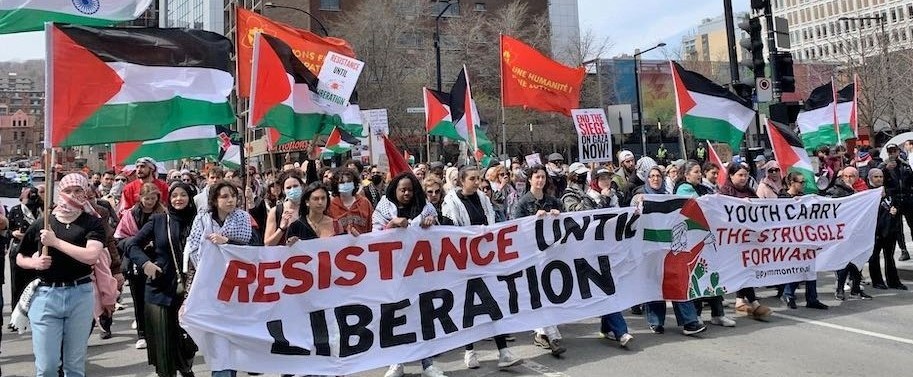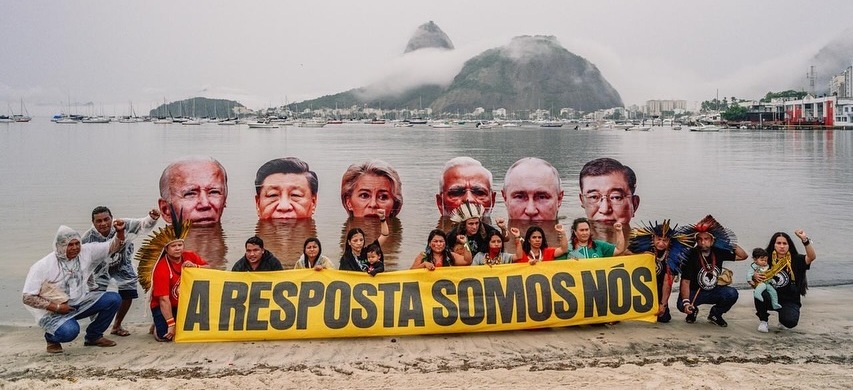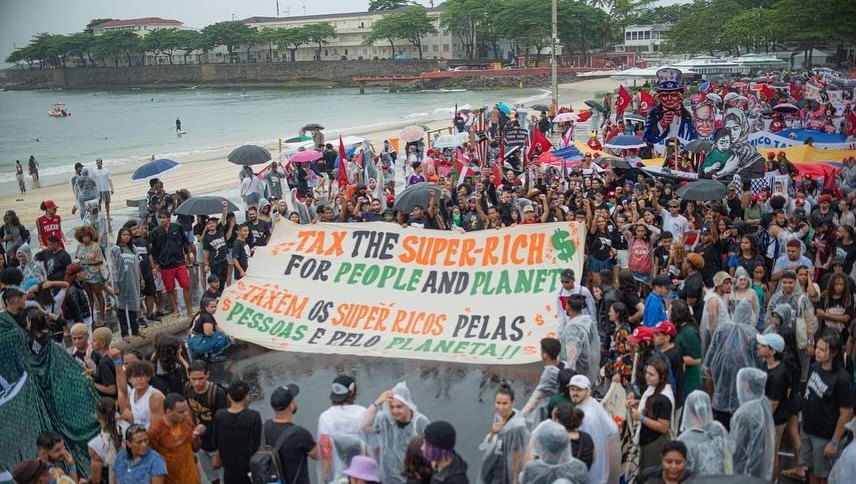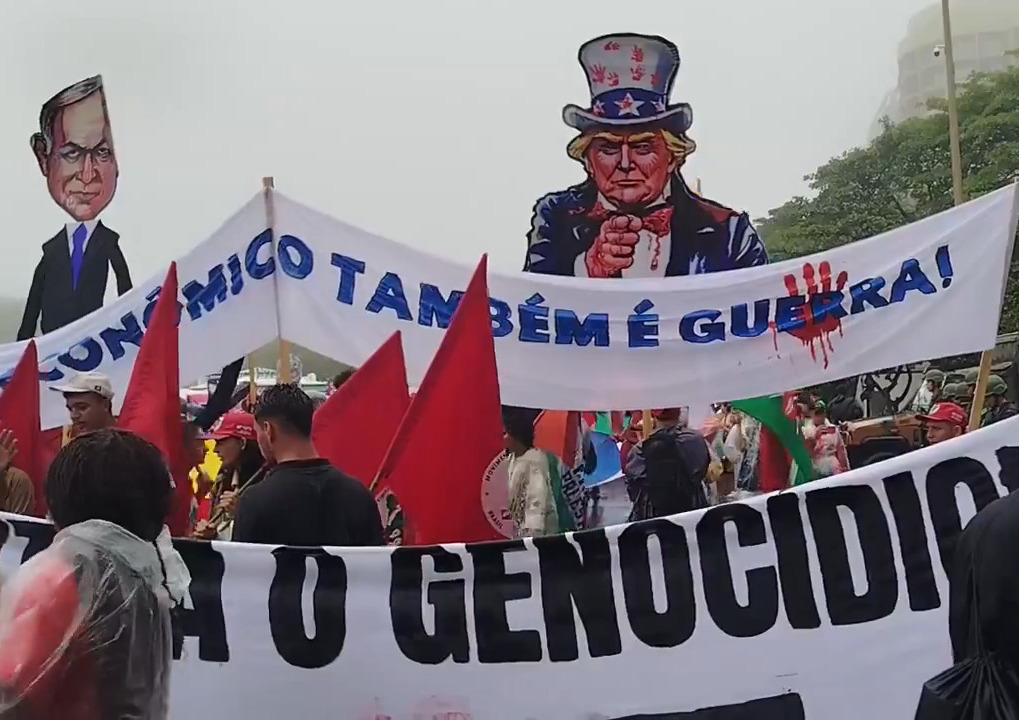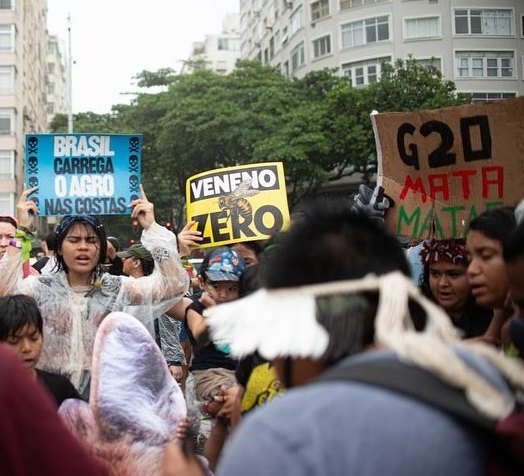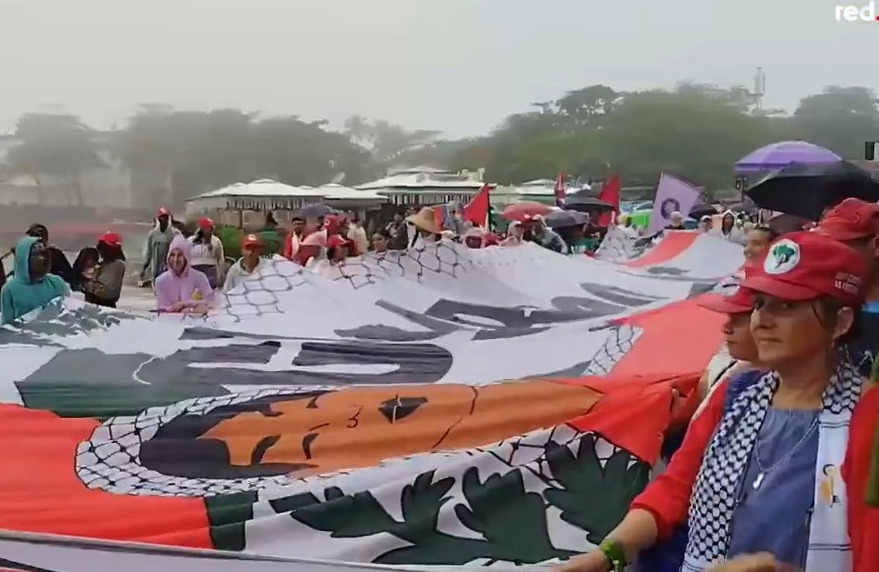No. 11
November 2024
The Order of the New World Order
• Keeping the
Initiative in the Hands of the Resistance
Movements Is Crucial
Urgent Need for Democratic Renewal
• Unconscionable Use of Election Law to Target Political Protest
• Longest Ballot
Committee Responds to House of
Commons Committee
Workers Demand a Post Office Which Is Part of Nation-Building
• Postal Workers'
Strike Lifts the Veil on Anti-Social
Direction of the Economy
Supply Management Bill Before the Senate
• Hands Off
Canada's Supply Management!
Stand with Canadian and Quebec Farmers!
• Attempt to Stop
Global Affairs Canada from Selling Out
Small and Medium-Sized Farmers
• Who Said What on Supply Management Bill C-282
Sellout of Canada's Resources to Rio Tinto
• Rio Tinto and
Quebec Government Join Forces to
Supply Critical Minerals for U.S. War Economy
• Aim of Making Quebec a "World-Class Lithium Hub"
• Benefits to Rio Tinto of Canada's Pay-the-Rich Schemes
All Out to Defend the Rights of All
• Broad Opposition to Canada's New Immigration and Refugee Cuts
• Canada Needs a Just and Modern Immigration Policy that Upholds Rights by Virtue of Being Human
• Immigrant Rights
Organizations Demand Government
Reverse Immigration Cuts
• Information on Sector-Specific Work Permits
Fall Session of Quebec National Assembly
• A Cartel Party Circus to Drown Out Serious Deliberations
British Columbia Election
• Reflections on an Electoral Process that Excludes the People
Halifax International Security Forum, November 22-24
• Militant Anti-War Rally Defends the Interests of Canadians
G20 Leaders Summit, Brazil, November 18-19
• Another
Failed Attempt by Canada and U.S. to Rally
Support for Ukraine Against Russia
• Protesters
Demand Accountability and
Action for Global Crises
Commonwealth
Heads of Government Meeting,
Samoa, October 21-26
• Reparations Row
Shows the Commonwealth Is Long
Past Its Sell-By Date
The Order of the New World Order
Keeping the Initiative in the
Hands of the
Resistance Movements Is Crucial
As we approach the Year End, assess the achievements of the past year and lay plans for the coming year, we cannot escape the fact that the peoples of the world are experiencing grave insecurity. This insecurity is a result of economic conditions, climate crises and constant threats and acts of war, up to and including nuclear war. Threats of invasion and occupation, and actual invasions and occupations and extreme forms of violence have become the new normal. Other terrible catastrophes due to the climate crisis, growing impoverishment of ever greater numbers of people, the starvation of entire peoples, forced migrations, famines, irrationality and more are to be accepted as commonplace, ordinary, the new order of things.
This is what the U.S. rules-based order, to which Canada is glued, has brought to the world.
Assessments, analyses and different interpretations from all quarters are often given without looking at the actual developments or even knowing how to look at the developments. Instead, humanity is to accept the narrative provided by the governments of the United States and its allies, including Canada, and spokespersons from academia and think tanks as well as pundits and talking-heads of various kinds. The reference point they tend to give for discussion, which is generally taken up worldwide, is based on the image of the world created at the end of the bipolar division of the world. This image is given from the perspective that the international system is now unipolar, dominated by one superpower, which -- in the words of Madeleine Albright, the first woman to hold the position of U.S. Secretary of State (1997 to 2001) -- demanded its place as the "indispensable nation."
This perspective that the world is unipolar and the U.S. is the "indispensable nation" is in the course of being debunked but has yet to be replaced. In fact, it is already evident that a crucial mission of the new Trump administration in the United States -- which will be officially inaugurated on January 20, 2025 -- is to make sure the U.S. remains the main reference point in the world order. Meanwhile, everything is being done to divert attention from the order of the new world order.
After the fall of the Soviet Union, the image of the U.S. as superpower was no longer tied to a territorial base. The argument of nation-states being autonomous and having their own sovereignty was given short shrift. It was the image of this unique superpower which became the reference point for any discussion on the significance of current developments.
This international system is now being challenged by countries striving to create a rule of law grounded in multipolarity, or an end to polarity altogether. But the difficulty persists in establishing a reference point which is not the one given from the end of the Cold War on down to today, in the U.S. and elsewhere, of the U.S. as world leader, the superpower, the country responsible for world peace and for the crimes that go along with being the superpower.
Also elusively floating around the world is the mirror image of the superpower as the image of a global "War on Terror." This global "War on Terror" also does not occur as a phenomenon solely within nations but as an international threat based on definitions provided by the same superpower pursuant to its "rules-based order."
Without discussion this image is given as analysis. The logic is that the U.S. is the superpower because of its economic capacity, military projection, cultural influences, and so on. That is the idea which is projected of a superpower that sits atop the world. It is not limited to a nation-state or its territorial integrity. So too its mirror image of the global "War on Terror." On the basis of this reference point, what is passed off as discussion is about issues like whether the economic power of the U.S. is declining as compared to the economic power of other countries or other countries in combination; whether its military arsenal is adequate to tackle the global "War on Terror" now that the use of Artificial Intelligence (AI) has become the norm and essential in the development of weapons systems; whether "nuclear deterrence is sufficient, effective, just, or ethical," and the like.[1]
Thus we have the narcissistic image of "superpower" and "terrorism" not rooted in the actual trials and tribulations of the peoples or their struggles in seeking independence, peace, freedom and democracy as they choose their own way of life, their own system of governance, and so on. We are presented with supranational phenomena beyond our ability to comprehend or control.
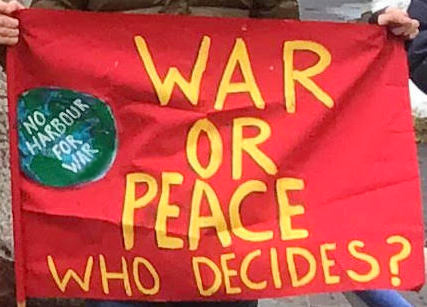 What is most significant is that,
other than holding the threat of terrorism including nuclear
annihilation over humankind, those who seek to limit discussion
in this way ignore that if there is a problem of major war on
the horizon, or catastrophes of other kinds, these are problems
that affect everyone. This means they pertain to the sphere
which concerns the general interests of the society, and of the
whole world.
What is most significant is that,
other than holding the threat of terrorism including nuclear
annihilation over humankind, those who seek to limit discussion
in this way ignore that if there is a problem of major war on
the horizon, or catastrophes of other kinds, these are problems
that affect everyone. This means they pertain to the sphere
which concerns the general interests of the society, and of the
whole world.
Also ignored is that humankind is living in a period of extreme transition, disequilibrium and rapid changes. This came with the collapse of the international system called a "bipolar system" where the world was supposed to be divided and decisions were made between two superpowers that built their own coalitions and alliances to carry out divisions, contention and collusion in the world on their own. The collapse of the state system of the former Soviet Union and the collapse of the international system it was part of, the bipolar system, left the world situation in flux.
All of us talk about the various problems which are increasing, such as the great violence that exists; and all the criminal acts of the imperialists and reactionaries of all types. But something is very actively intervening to prevent the people from actually cognizing the relations that exist that give the basis for society, the relations between humans and humans and humans and nature and what they reveal -- which is the absence of political power in the hands of the peoples of the world.
It is the Resistance Movements of the peoples of the world which represent that striving to create a New World, the historical necessity to settle scores with the old conscience of society which deprives the peoples of the world of a role in making history. Everything possible is done by the ruling elites to deprive the peoples of an outlook of their own and their own agency as history makers. By dismissing the Resistance as evil, as the raison d'être for the global "War on Terror" which is not to be questioned, the aim is to eliminate the striving of the peoples to create a New World.
When talking about war as inevitable, the discussion cannot be taken up without also looking at this problem that people are deprived of an outlook by permitting so-called analyses on the inevitability of war that are based on the narcissistic image of "superpower" and "War on Terror." Such analyses are not rooted in the actual trials and tribulations of the peoples or their struggles for peace, freedom and democracy. It is also important to recognize that it is not a choice between the U.S. "rules-based international order" and the existing rule of international law. What is required is to rely on neither and instead develop a new world order and international institutions and law, where it is the peoples who decide, not the big powers.
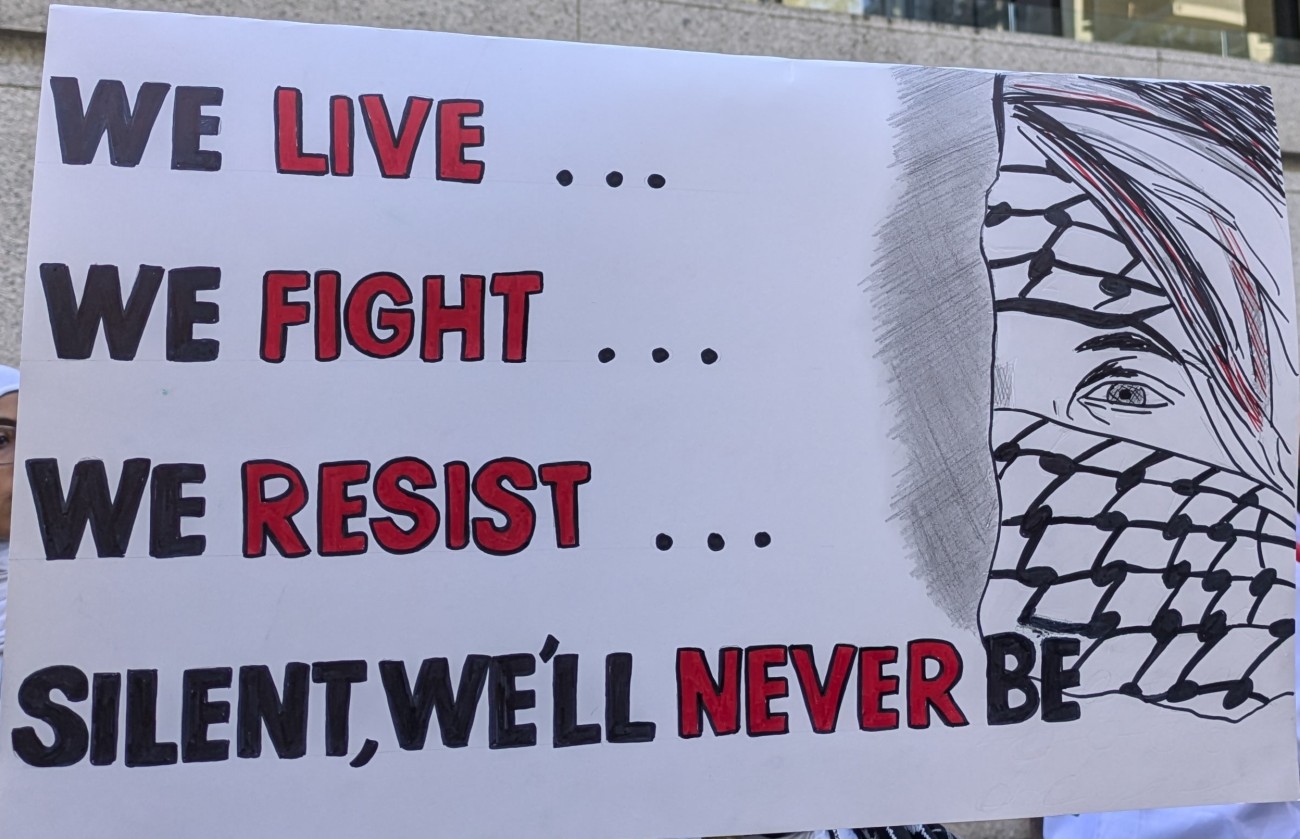 Keeping the initiative in the
hands of the Resistance Movements has been one of the greatest
achievements of the past year in which the big powers and their
cartels, coalitions, blocs and institutions have done everything
within their power to deprive the peoples of their own outlook
and agency. And on the eve of the New Year, they continue to do
so, going so far as to say that by espousing a reign of terror
in Syria, along with the genocidal regime they continue to prop
up in Israel, the Resistance is defeated.
Keeping the initiative in the
hands of the Resistance Movements has been one of the greatest
achievements of the past year in which the big powers and their
cartels, coalitions, blocs and institutions have done everything
within their power to deprive the peoples of their own outlook
and agency. And on the eve of the New Year, they continue to do
so, going so far as to say that by espousing a reign of terror
in Syria, along with the genocidal regime they continue to prop
up in Israel, the Resistance is defeated.
Far from it. Just as their claim to be democratic and uphold human rights died in Gaza, their claim to be champions of the "War on Terror" has bitten the dust in Syria. The terrorist enemy they themselves created in the first place, has now become their friend and champion. Thus the need for the peoples of the world to stand steadfast as one with the Resistance forces when they lay their plans for the coming year. Far from being defeated, the Resistance Forces stand tall and strong, steadfast in showing the way to achieve peace, freedom and democracy.
The more the danger of war and crises of much greater proportions loom on the horizon, the obvious point which is eclipsed in discussion is how to build an alternative by engaging in Resistance. It is more necessary than ever for peoples everywhere to establish through their deeds how they can overcome the situation of being deprived of power and can empower themselves. It is necessary to devise a new order which permits the conflicts which exist in the world to be settled without resorting to the use of force.
This is the crucial work to be taken up as the world prepares to enter a New Year in which the challenges facing the peoples require unity of purpose to make sure the initiative remains in the hands of the peoples and their Resistance Movements.
Keep in mind the key feature of official narratives and those coming from both left- and right-wing sources is to deprive people of the thought material and outlook they require. This is done by putting them on the defensive when their reference point remains the twin images of indispensable superpower and the world of terror from which the world must be saved.
It is presumed the world order, and that of each country, is the sphere of activity of the state, its raison d'état. The order is imposed by the state from on top or from without by foreign states, when in fact it comes from the ensemble of relations humans enter into with one another and between themselves and nature. It comes from the striving of human beings to humanize the natural and social environment. Any other conception of order serves systems in which people are deprived of decision-making power and their own thought material and agency.
It is consequently important to understand disinformation as not simply the lies and misinformation and all the racism and anti-people ideas, fascist ideas, medieval ideas, which there are tons of, but as the actual intervention in the system of world thought which leads to the disruption of actually looking into the situation and the possibilities which lie within it.
Prepare for the New
Year by Making Way for Renewal!
Make Canada a Zone for Peace!
Note
1. An example of what is considered an ethical use of nuclear deterrence is "to avoid use of nuclear weapons against any target that could be neutralized by conventional weapons" (Just and Unjust Use of Nuclear Deterrence, Scott D. Sagan).
(With files from the work on modern definitions carried out by CPC(M-L)'s Ideological Studies Centre (ISC). Photos: TML, A. Querry)
Urgent Need for Democratic Renewal
Unconscionable Use of Election
Law to
Target Political Protest

It is clear that the initiative of the Longest Ballot Committee is the target of the amendment. It remained true to its project by responding as follows: "We are disappointed to see Elections Canada take such a leading role in the development of measures directly targeting us, a grassroots group who simply points out that MPs shouldn't be in charge of writing their own elections and ethics rules." Of significance is what it added: "In any case, the new amendments won't succeed in stopping our campaign. We work smart, not hard, and if the rules say we need to get more signatures from more people, we will happily collect them."
Thus, whatever amendments Elections Canada proposes will be to no avail. The perception of Canadians that the Electoral Law brings cartel parties to power to perpetrate a rule which exists above the people will not be changed by such measures. These measures merely serve to further disempower the people and thus deepen the crises of credibility and legitimacy in which the institutions called democratic are mired.
 The amendment was proposed by
Chief Electoral Officer (CEO) Stéphane Perrault on November 21
during his appearance before the Standing Committee on Procedure
and House Affairs (PROC). He displayed the 91-candidate-long
ballot for the recent LaSalle–Emard–Verdun by-election in
Montreal and said: "As members are aware, there is a protest
movement that has encouraged large numbers of candidates in the
44th general election and in four recent by-elections. [...] We
have now reached the point where any further increase to the
number of candidates will require me to reduce the font size on
the ballot, further compounding accessibility challenges.
Marking and counting modified ballots takes longer and is more
complex for voters and election workers."
The amendment was proposed by
Chief Electoral Officer (CEO) Stéphane Perrault on November 21
during his appearance before the Standing Committee on Procedure
and House Affairs (PROC). He displayed the 91-candidate-long
ballot for the recent LaSalle–Emard–Verdun by-election in
Montreal and said: "As members are aware, there is a protest
movement that has encouraged large numbers of candidates in the
44th general election and in four recent by-elections. [...] We
have now reached the point where any further increase to the
number of candidates will require me to reduce the font size on
the ballot, further compounding accessibility challenges.
Marking and counting modified ballots takes longer and is more
complex for voters and election workers."
Why reducing the font size is the only option is questionable. Other countries have hundreds of names on their ballots when elections are held for national/federal positions, and for positions on the state, municipal and local levels all at the same time. They seem to manage without such fuss because it is a matter of political culture, not a matter to be made punishable by law. But none of this is discussed by the cartel parties with seats in the Parliament, let alone the urgent need to democratize the political process and electoral law itself.
Perrault told PROC that the Longest Ballot initiatives have put him in the uncomfortable position of having to use his discretionary powers to produce ballots contrary to what is prescribed by law, or as he put it, the "wish of Parliament." No MP asked why he didn't propose an amendment to the provision stipulating the format of the ballot.
At this point, the amendment proposed by Perrault is not in Bill C-65. The legislation has passed second reading in the House of Commons, so only amendments addressing matters pertaining to the general principles already approved by the House of Commons can be added in Committee. As it stands, Bill C-65 reduces the number of signatures required for candidate registration from 100 to 75. This proposal was said to facilitate the registration of candidates.
It was not explained that the proposal was made at the request of the cartel parties with seats in the Parliament whose candidates clearly have difficulty getting endorsed by electors. It is common knowledge that many of the cartel party candidates have front doors slammed in their faces because people are so fed up with the rotten system of Party government and with the cartel parties themselves. Many have trouble getting 100 signatures to endorse their nominations to become candidates in an election. All of it is nonsensical since electors exercise no control over which candidates are selected to "represent" them in any case. It is the national leader of a party who has the final say as to who can be a candidate and this is precisely what electors are objecting to! The irony is that reducing the number of nomination signatures from 100 to 75 is not going to help the reputation of the cartel parties in any way, but it will make it easier for the Longest Ballot Project to get the signatures they need to nominate candidates who advocate for the reform of the electoral process!
Nonetheless, to now propose an amendment which obstructs electors from nominating whoever they want, and going so far as to penalize them for doing so, is questionable, to say the least. Canadians have become accustomed to the "balancing act" that pits upholding civil rights -- in this case the right to elect and be elected -- against national security. However, the suggestion that the prescribed format of a ballot trumps the right to participate in elections is a new low.
On reflection, it is most likely the sign of a system at its wit's end; definitely one in need of renewal.
Perrault said that while he supports the reduction in the number of signatures required to nominate a candidate, "it is important to ensure that the requirement for supporting signatures is not turned on its head. In the case of the Longest Ballot initiative, we have seen nomination papers for the various participating candidates signed by the same electors. This indicates that voters who sign the nomination papers are not supporting the nomination of a particular candidate, but rather the idea of having as many candidates as possible, whomever they may be (consistent with the goals of the Longest Ballot initiative)."
In fact, he cannot say for sure why voters sign the nomination papers of many candidates, and simply reduces their reasons to "the idea of having as many candidates as possible." Why they want "as many candidates as possible," he does not say. In fact, he totally ignores the expressed intention of many who say they are doing so to make a statement that they want the democratic renewal of the electoral law, which is the stated aim of the Longest Ballot Project.
Electors who sign many Longest Ballot nomination papers do so precisely to indicate that they support the slate of candidates putting forward the cause of electoral reform.
Members of PROC responded positively to the openly declared aim of obstructing the Longest Ballot project. The initiative emerged during the 2021 federal election as a form of protest against the first-past-the-post method of counting ballots and for the right of citizens to an electoral system of their own determination. It was also to protest the Trudeau government's betrayal of the Liberal Party pledge in the 2015 election to get rid of the first-past-the post method of counting votes. PROC members' only concern was what impact the proposed amendment might have on their own candidacies in the event an elector nominates more than one candidate unbeknownst to them.
What a dilemma! It merely underscores that what is irrational cannot be made rational. The sooner the electoral process is renewed to make it conform with elementary democratic expectations the better.
Conservative MP Michael Cooper noted that the Longest Ballot candidates share a common official agent and asked if Perrault had considered tackling the "problem" from that angle. Perrault responded that it would not be an effective method because the Longest Ballot candidates file nil returns and filing them is a small task.
In a document the CEO of Elections Canada tabled with PROC, the recommendation claims to ensure that no citizens would be prohibited from becoming a candidate: "A prohibition on supporting the nomination of more than one candidate should be added, accompanied by sanctions for those who sign more than once or incite others to do so. It should be made explicit that the inclusion of a signature on more than one candidate's nomination paper should not invalidate either nomination."
What then is the point of the amendment? As I said, the system is at its wit's end.
Most disconcerting is that MPs and Mr. Perrault himself are apparently oblivious to the dangerous course being taken by Elections Canada, which is supposed to be a neutral administrator of elections. This is a rudimentary requirement in any country which calls itself democratic. Obstructing political action that targets the first-past-the-post method of counting ballots and the Liberal government's failure to make good on its promise to end it is far from political neutrality. This is particularly disconcerting in a situation where the Canadian establishment, starting with its intelligence agencies -- Canada's secret political police -- are denigrating political opinions, such as opposition to NATO or support for friendly relations with China and even criticisms of Canadian democracy, as examples of alleged foreign interference and suggesting that Elections Canada and the Commissioner of Canada Elections should play a larger role in countering such "foreign interference."
It is not without irony that this move aims to obstruct a citizen initiative that is putting forward the important question of who should decide the form the electoral system should take. The Longest Ballot Committee is calling for an end to the self-serving control exercised by the cartel parties over electoral legislation and demanding the creation of a national constituent assembly to decide.
To view video of Perrault's appearance before PROC click here.
Longest Ballot Committee Responds to House of Commons Committee
Tomas Szuchewycz, official agent for the Longest Ballot Committee in the 2024 by-election in LaSalle–Émard–Verdun, sent the following letter to the House of Commons Procedure and House Affairs Committee (PROC) concerning the amendment they are considering to block the Committee's protest. The Longest Ballot Committee was responsible for the ballot with the second highest number of candidates in Canadian history – the ballot for the 2023 election of Toronto's mayor had more with 102 candidates.
 With firm hands and a clear conscience,
we, the Longest Ballot Committee, do address thee,
With firm hands and a clear conscience,
we, the Longest Ballot Committee, do address thee,
Oh, you gracious servants of the people, champions of the working and middle classes, defenders of the downtrodden, torchbearers of the purest integrity and most virtuous principles, whose wisdom and generosity are unrivaled, you, whose honour stands as a fortress against corruption, you paragons of ethics and stalwarts of justice, you, the architects of progress, the keepers of order, the voices of reason in an age of deception, you, the leaders, whose service to the nation is unmatched in devotion and purpose, whose legacy will forever be etched in the annals of our glorious history as the most blessed and revered lawmakers, you the esteemed members of the PROC.
Election Rules and a Conflict of Interest
You have surely noticed, that you, women and men whose names appeared on the ballot (and will likely be put on the ballot again) are the very same who now wield the pen to set the rules by which this contest shall next be played. What a curious situation it is, then, that one who stands to gain from the outcome of the electoral struggle should also be granted the authority to decide its terms.
This, we must declare, is a conflict of interest as glaring as the sun, and as foul as a spoiled harvest.
We do not seek to cast shadows upon your character -- far from it! For we know you are people of fine standing and good fortune. But the spirit of fairness and the laws of justice must hold sway, and here we see neither fairness nor justice. Here we are, with a contest where you are both the player and the referee. Does that seem to you an arrangement worthy of the people's trust?
Therefore, we do humbly request that you recuse yourself from the power to dictate the very rules by which your own victory might be won. Step aside, release your claim to the pen, and let fair impartial hands take up the task. The people must be assured that the game is not rigged, that the rules are not written for the benefit of whomever may have won the last election, but for the flourishing of all.
Electoral Boundaries and Lessons Learned
We must acknowledge the wisdom of those who came before you and acted to right this wrong when it came to drawing electoral boundaries. Many seasons past, your predecessors faced the question of drawing the boundaries by which their fortunes might be decided. They made the right call, though it was not an easy one. They chose to step aside, and rather than holding the pen of power in their own hands, they entrusted the task to independent boundary commissions -- bodies free from the sway of political winds, whose sole purpose is the upholding of fairness and the preservation of the public's trust.
By this act, they proved their noble spirits. For in stepping away from the very process that could favour their own ambitions, they demonstrated that the health of democracy matters more than the fleeting gain of the moment. Thanks to their foresight no ruling party can bend the lines to its own advantage. This decision was a triumph of principle, and one that should be held up as an example to follow. The commissions' independence has safeguarded the integrity of the process, and in so doing, ensured that boundaries are drawn with fairness, for the benefit of all voters, and not those in power.
Reflect and Recuse
As clear-sighted and honourable servants of the public you must recognize the wisdom of your predecessors and heed our request. For the sake of fairness and the integrity of our electoral system, please reflect and recuse yourselves from the setting of election rules. For the good of our shared democracy, stand aside and instead strengthen our democracy by establishing an independent, nonpartisan, and permanent body to take up the task. We believe an institution modelled on a citizens' assembly would be the most appropriate, however we recognize the details are yours to decide.
Let it be known that our resolve is firm, our hearts are bold, and spirits unyielding. You can try to block our way, but you will find no weakness here. Our course is set, and we shall see it through.
(November 24, 2024)
Workers Demand a Post Office Which Is Part of Nation-Building
Postal Workers' Strike Lifts the Veil on Anti-Social Direction of the Economy

The struggle of postal workers to defend their rights and claims lifts the veil on the need for a new direction for the economy in Canada, the U.S. and elsewhere. The ruling elites want to put every aspect of the economy in their grip, serving their aims for maximum private profit and world domination. To do this they seek to destroy all vestiges of workers' rights and claims on the value they produce and any remnants of nation-building. In other words, the working class must bear the burden of imperialist profit-seeking, wars and dictate. The working class is to be deprived of a modern economy that has the capacity to meet the needs of all, providing peace, security, and services within a vibrant social fabric.
The premise of Canada Post to provide letter delivery to every address in Canada at a subsidized market price is an element of nation-building. Postal workers providing this nation-building service produce enormous value for the national economy. The Canadian ruling elite consider this nation-building work of postal workers a "cost" and burden on the economy even though big business has long benefited from low prices to deliver their business mail.
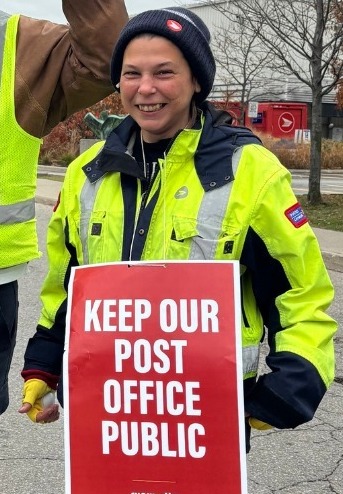 Now that electronic options are
available for business mail, a section of the ruling elite seeks
to destroy the original nation-building purpose for Canada Post
even though millions of Canadians still rely on it. Latest
statistics indicate that on average every address in Canada
receives two letters a week with workers delivering in total 2.3
billion letters in 2022.
Now that electronic options are
available for business mail, a section of the ruling elite seeks
to destroy the original nation-building purpose for Canada Post
even though millions of Canadians still rely on it. Latest
statistics indicate that on average every address in Canada
receives two letters a week with workers delivering in total 2.3
billion letters in 2022.
As the percentage of these pieces of mail as business letters dwindle, the ruling elite have less interest in keeping the market price low through government subsidy. This can be seen in the sharp increase in postage stamp prices, which individuals must pay, and with the introduction of a postal crown corporation that must act on its own using imperialist accounting without government subsidies.
The ensuing accounting losses give Canada Post's attacks a theoretical dimension as the ruling elite deliberately confuse the issue of economic value. They contend that unless the new value workers produce is transformed from use-value into exchange-value as money, which they can expropriate as private profit, then the value workers produce magically disappears and cannot be considered new value. This greedy outlook is reflected in the constant, shrill demand that postal workers must accept diminished wages, benefits and working conditions in order for their employer to operate profitably in conditions of stiff competition in their sector of the economy. This means the economic value of a nation-building project such as Canada Post when estimated in money through false accounting as exchange-value becomes a "loss" and burden on the economy and nation. The use-value of providing a postal service throughout the country becomes hidden behind the rulers' reference point that every economic unit in the country must deliver private profit to those who own and control the economy. Otherwise, for the rulers, those units delivering use-value as public value become a dreaded "cost" and burden.
The sector of the ruling elite heavily invested in the communications and delivery sectors are those behind the push to destroy Canada Post including parcel delivery. They have experienced a big surge in profits on this front as the workers they engage are not yet organized to defend themselves and are thus prone to super-exploitation. Such is the case with full and part-time gig workers who now number more than 2 million in Canada.
The super profits from these exploited workers have whetted the appetite of the private owners involved to go for more. Their campaign to destroy and privatize Canada Post is yet another aspect of the anti-social offensive that is driving down the working and living conditions of Canadians.
No unanimity exists within the ruling elite for dealing with Canada Post. One section directly derives private profit from delivering parcels and mail so competes with Canada Post, while another section would rather see the market price of delivering parcels and mail kept as low as possible, at least for their businesses. As long as the burden to keep the market price low is kept on the working class through the exploitation of gig workers and not through public subsidies for Canada Post, the ruling elite overall are satisfied.
When communication and delivery gig workers fight, as they are, to raise their pay and benefits and stabilize their working conditions, the same ruling elite will seek an alternative. This could be a return to Canada Post as the primary delivery enterprise with a lower market price subsidized through public funds. The class struggle of all the workers involved to defend their rights and claims will determine the outcome, as the strike by postal workers shows.
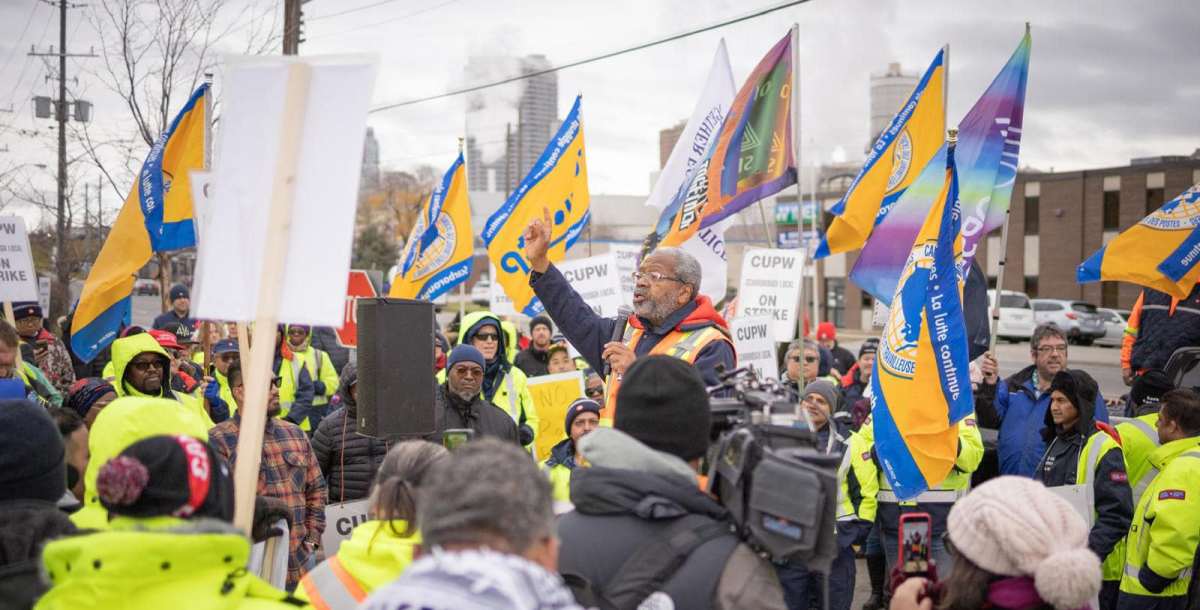
Scarborough postal workers' rally, November 25, 2024
The just struggle of postal workers to defend themselves and the post office as a public service is an important part of the overall struggle to oppose the anti-social offensive of the rich and organize for a new pro-social direction and aim for the economy. The many unions and community members standing with the postal workers are also contributing to the broad struggle for a new direction for the economy that meets the needs of all working people.
Through actions in support of Palestine and rights of workers, people across the country are giving expression to their demand to change the current destructive pro-war aim and direction of the economy that serves the U.S. war economy to a pro-social, anti-war direction. The working class, which produces the new value required for the existence of the people and nation more and more sees the need to take charge of the situation, to constitute the nation itself and vest sovereignty in the people. Postal workers are doing their part to defend nation-building. Let us all do our part to stand with them and together organize and struggle for a new direction for the economy and country.
(Photos: CUPW, AIMAW, S. Xu)
Supply Management Bill Before the Senate
Hands Off Canada's Supply
Management!
Stand with Canadian and Quebec Farmers!
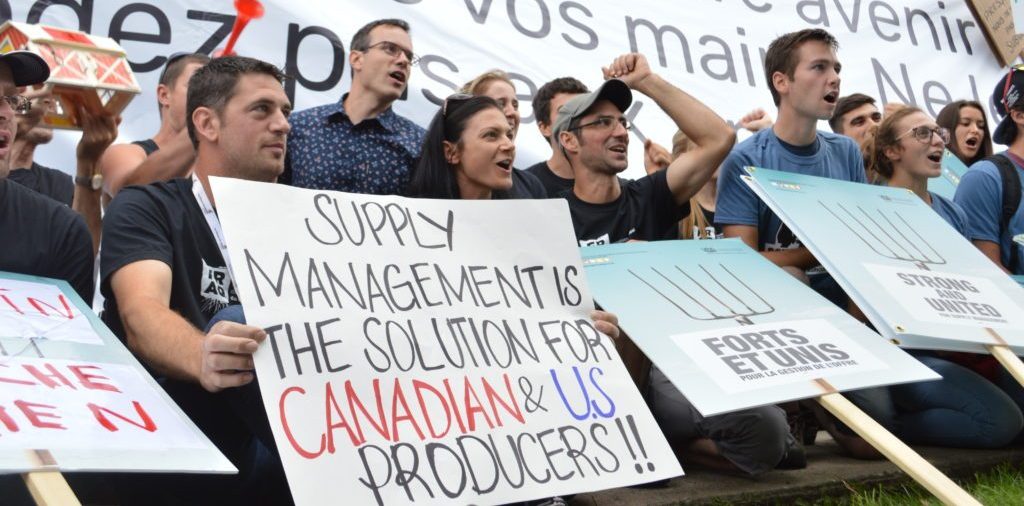
Dairy farmers' protest, Montreal, September 6, 2018 during
renegotiation to replace NAFTA
Certain cartel politicians, U.S. officials, non-governmental organizations and monopoly-controlled media, have broadened their attack on Canada's right to control its own agricultural system. The Quebec and Ontario dairy, poultry, and egg sector is one of the last vestiges of a Canadian economy independent of U.S. imperialist control.
The Canadian economy since World War II has little by little been integrated into the U.S. war economy and is not serving the Canadian people, whose demand is that it to be independent and self-reliant. This integration has occurred despite Canada having abundant resources, a vast land base and an educated and skilled working class capable of building and manufacturing whatever is needed. Canada's people and resources -- minerals, oil, gas, wood, agricultural land, and fresh water -- are precisely a target of U.S. imperialism and its huge military and endless wars.
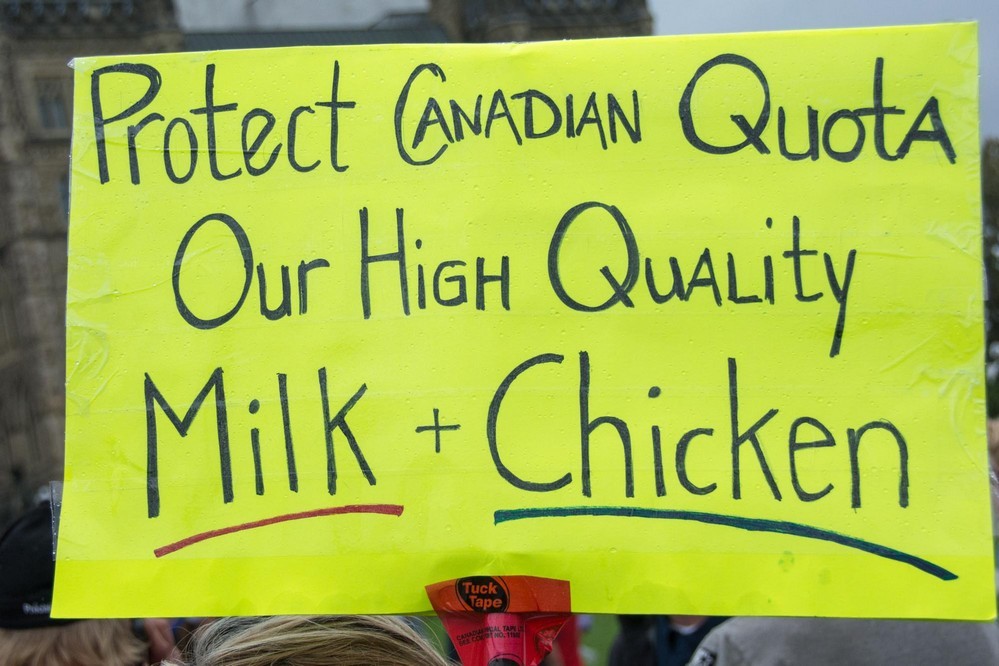 The dairy, poultry and egg sector
still serves the farmers, the Canadian and Quebec economy and
peoples more generally as it has so far resisted the waves of
U.S.-led global assaults to dominate it. This has been
accomplished with farmers' resistance and support of the working
class in waging a determined struggle to retain what is called
"supply management."
The dairy, poultry and egg sector
still serves the farmers, the Canadian and Quebec economy and
peoples more generally as it has so far resisted the waves of
U.S.-led global assaults to dominate it. This has been
accomplished with farmers' resistance and support of the working
class in waging a determined struggle to retain what is called
"supply management."
Controlling the supply of produce allows Canadian and Quebec dairy, poultry, and egg producers an element of power over how much produce is produced, thus keeping its quantity in line with demand. This in turn allows the market price to remain near farmers' price of production. The monopolies often use market price manipulation to force small producers into a situation where they receive a price lower than their price of production. This bankrupting and monopoly takeover by the rich concentrates ownership of the economy in fewer hands that become richer and more powerful.
Supply management also allows a gradual less chaotic introduction of modern production methods to improve productivity without unduly harming farmers' well-being and the survival of their local communities. The supply management system of regulations has become an important defence against U.S. farming cartels and global financial oligarchs seizing control of the sector as they have done in the U.S. There, monopoly interests have become dominant, wiping out most small and medium-sized farming operations.
Supply management in Canada and Quebec has allowed local dairy, poultry and egg farmers, suppliers, and their communities to survive, although not without difficulty and some loss. This is mainly due to factors such as mounting debt, the general rise in land prices throughout the country, and the difficulties involved in the transfer of farm enterprises from one generation to the next.
U.S. monopolies control that country's dairy, poultry and egg sector. They have long demanded that Canada and Quebec "open up" the sector to allow those same monopolies and global financial interests to seize control of Canada and Quebec's production, distribution and pricing of these foods.
The aim of their demand that supply management be eliminated is to turn the sector into yet another avenue of maximum profit for the private investors in the cartels. The owners of these cartels likely have little or no connection to agriculture or the lives of people in the farming communities. Their "opening up" of the sector through the elimination of supply management would quite quickly result in the takeover of most Canadian and Quebec dairy, poultry and egg small and medium-sized farms, their local suppliers, and distributors. This would destroy the viability of their communities and force the displaced families to seek work in the densely populated cities.
It is important to oppose what the government of Canada is doing under the guise of high ideals. All of this has been going on since before Trump. It shows that the back and forth between Trump and Trudeau and various officials of both countries is intended to divert the attention of Canadians from what is really going on as concerns the unacceptable integration of Canada into the U.S. economy, against the interests of the peoples of both countries.
Attempt to Stop Global Affairs Canada from Selling Out Small and Medium-Sized Farmers
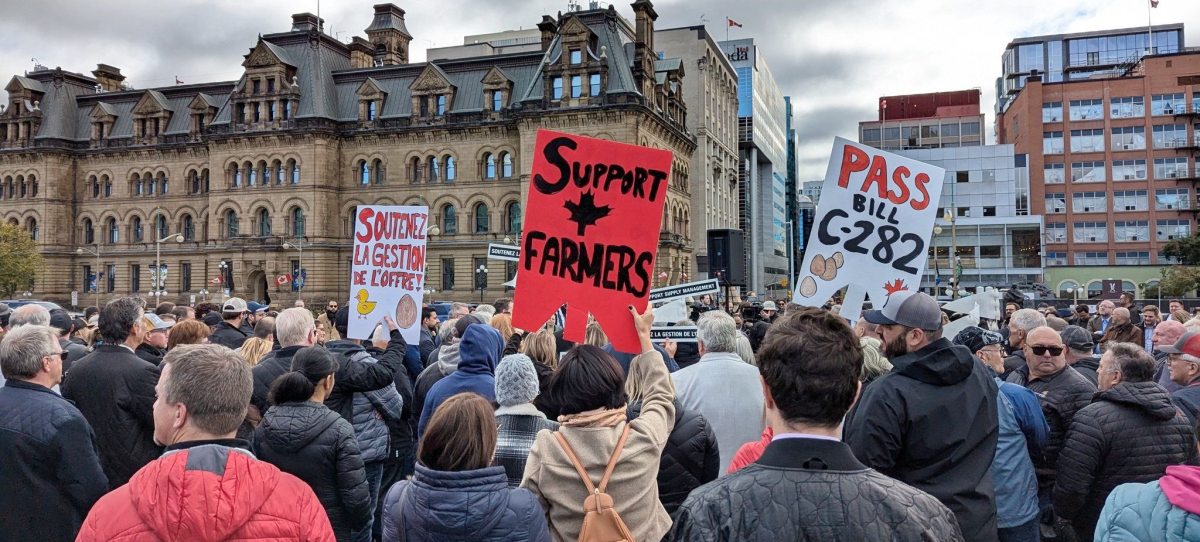
Rally on Parliament Hill, September 10, 2024, in support of Bill
C-282
Luc Thériault, Bloc Québécois Member of the House of Commons, introduced the private member's Bill C-282 in June 2022. The bill aims to amend "the Department of Foreign Affairs, Trade and Development Act (specifically supply management) so that the Minister of Foreign Affairs cannot make certain commitments with respect to international trade regarding certain goods" namely dairy, poultry and eggs.
Bill C-282 passed the House of Commons unanimously on February 8, 2023, and is now under consideration in the Canadian Senate Foreign Affairs and International Trade Committee. It is being subjected to intense U.S. pressure to defeat it.
The bill seeks to ban any additional supply management concessions in trade negotiations. Dairy farmers and their communities worry that the U.S. will push for the weakening, if not the total elimination of supply management in the upcoming renegotiation of the Canada-U.S.-Mexico free trade agreement (CUSMA).
Certain Senate members, the mass media and U.S. officials and non-governmental organizations are demanding the Senate reject Bill C-282 altogether and allow the U.S. takeover of Canada and Quebec's dairy, poultry, and egg sector upon the amendment of CUSMA. They have launched an attack centred on the claim that if Bill C-282 is passed, it will provoke the U.S. government to pull out of CUSMA altogether. According to them, this would throw the Canadian economy into turmoil. This is the U.S. standard practice of hooliganism in international affairs.
Monopoly-controlled media have launched hysterical attacks against the bill. They quote so-called trade watchers and former trade officials as saying Bill C-282 "invites retaliation, with Canada bracing for a U.S. response." They warn that "by threatening to add a new gripe to the list of Canada-U.S. trade disagreements, the adoption of a bill to ban supply management concessions could fuel a fraught review of the North American trade pact in 2026."
They report, "Critics of the bill have raised concern over the damage that could be done during the 2026 review of the [CUSMA] if supply management is pre-emptively removed from the negotiation list."
No concern whatever is expressed for the needs of Canadian farmers and workers more generally, and their striving for a self-reliant economy independent of the U.S. and its war machine.
U.S. officials have been blunt in imposing U.S. dictate. For example, Sharon Bomer Lauritsen, a former assistant U.S. trade representative for agricultural affairs from 2011 to 2020 says: "For any kind of negotiations, if you're taking a particularly important issue off the table before you even begin, that already sets up a very difficult situation to find a way forward."
These remarks are presented without discussion on the significance of Canada and Quebec's supply management system. The dictate does raise the possibility of opting out of the North America free trade agreement, which favours the U.S. private war interests, and instead opening a path to a new direction for the economy of self-reliance and independence. Such a direction provides a means to undermine the U.S. war economy, and contribute to solving the country's many problems, including making Canada a Zone for Peace.
In the view and analysis of many Canadians, CUSMA has intensified the U.S. takeover of the Canadian economy. They say CUSMA is directing the Canadian economy to serve the narrow private interests of U.S.-led global oligarchs and their war economy, and accelerating an anti-social descent with the draining of valuable social programs to pay the rich.
Many Canadians say CUSMA has taken the economies of all three countries further down the road of blocking and even negating a modern direction and aim for these economies to serve the people and their development as independent and self-reliant. The peoples of all three countries want trade with other nations to be for mutual benefit and development and not for war and exploitation which enrich powerful oligarchic interests.
Supply management has been a significant example of what can be done if the people resist imperialism, defend their rights and claims, and pursue a pro-social direction for the economy.
(Photo: M. Caron)
Who Said What on Supply Management Bill C-282
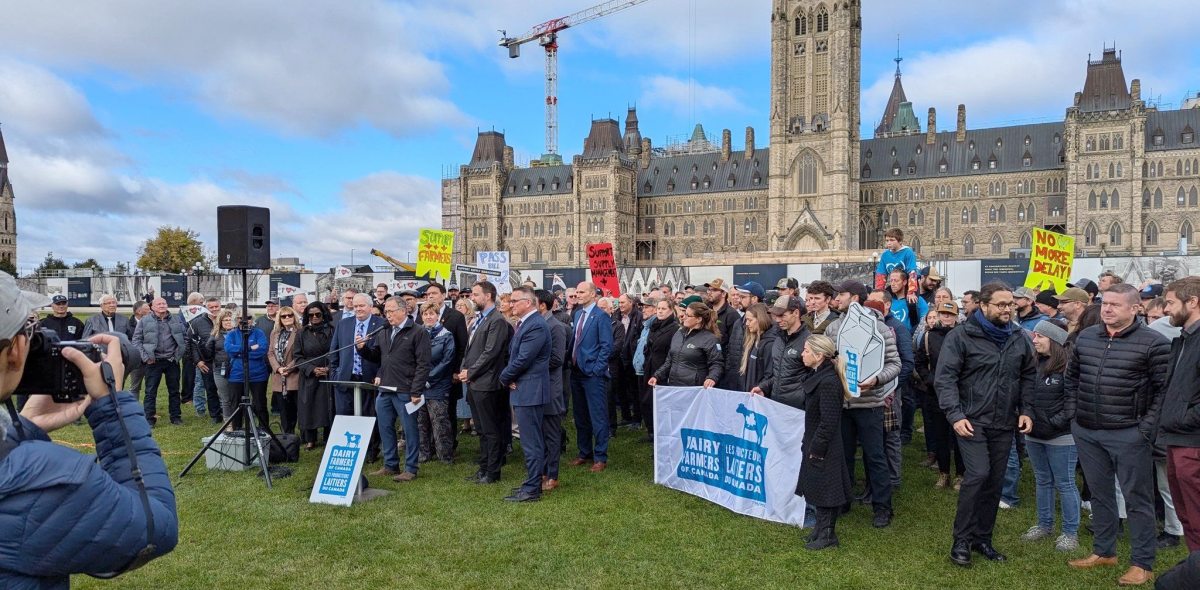 Rally on Parliament Hill, September 10,
2024, in support of Bill C-282
Rally on Parliament Hill, September 10,
2024, in support of Bill C-282
Much has been written and said in the monopoly media and by various government officials concerning Bill C-282 and Canada and Quebec's supply management system. TML Monthly examines below some of this material with editorial comments in double parentheses.
U.S. Chief Trade Representative Katherine Tai has said that dairy will be a point of discussion during the 2026 review of the Canada-U.S.-Mexico free trade agreement (CUSMA). "I would argue that we may not have a NAFTA or USCMA ((the U.S. moniker for CUSMA)) if this [Bill C-282] had been in place in 2017. I would have fully expected our dairy and our poultry industries to be up in arms opposing USMCA negotiations," she said.
U.S.-based trade consultant Eric Miller, president of the Rideau Potomac Strategy Group said that if Bill C-282 becomes law it would be a "real problem" for Canada during the review of CUSMA. "We know that one of the No. 1 priorities [for the U.S.] will be dairy," he said. "With an oversupply of milk in the U.S., Canada is one of the very few countries to which it can be exported without spoiling. If Canada enacts this [law], it will be in a situation where the U.S. will see it as a retaliatable measure. The U.S. would very well see it within its right -- especially under a Trump administration -- to say, 'If you don't want to give access on dairy then how about we take access away on other sectors.' It's inviting retaliation."
((The comment is indicative of the arrogance of U.S. imperialists. Having destroyed their own small and medium-sized farmers, they contend they have a problem with "oversupply of milk" and want to correct their problem on the backs of other countries. Their contention of "oversupply of milk" is tied to the imperialist system where food is a commodity for sale. If those in need of milk or other commodities do not have the resources and means to buy the commodity then an "oversupply" is declared as the problem.
Given widespread food insecurity in the U.S. especially among children, the contention of an "oversupply of milk" is tied to the aim of the monopoly farm producers and investors for maximum profit and the anarchy of the imperialist economic system, and not to meeting the needs of the people and the building of a pro-social economy.))
Eric Miller also said the U.S. would likely withdraw Canadian access to other U.S. sectors in retaliation, given the American approach to trade negotiations. "All the early indications are that dairy is pretty much at the top of the list of demands," he said. "If you take this area off the table, you are inviting the U.S. to take punitive action to put it back on the table."
(("Punitive action!" How can any nation have civil relations with a bully that takes "punitive actions" when it does not get its way?))
Miller contends that if Canada adopts Bill C-282 as law, it will contribute to the growing sense in Washington, DC, that Ottawa is no longer the U.S.'s closest ally.
((Canada already asks, "How high?" when the U.S. says "Jump!" Its policies are already in lockstep with those of the U.S. Taking his cue from this, Miller is repeating that only those countries that are bootlickers will not be attacked through tariffs, sanctions, blockades and even war. And that bootlickers had better capitulate. Meanwhile it goes without saying that those which capitulate are under merciless attack as a matter of course in any case.))
Miller said there is an increasing sense that Canada is not pulling its weight. "You've got dairy, you've got DST ((Digital Services Tax affecting the big U.S. social media cartels)), you've got defence spending, you've got a series of other irritants; the sense is that Canada is no longer the U.S.'s best friend," he said. "In Washington, if you ask U.S. officials in the Pentagon or even sometimes in the State Department, 'Who is the U.S.'s best friend?' The No. 1 answer you'll find these days is Australia."
"The sense is that Canada has a lot of demands and concerns about things, but it's not bringing solutions to the extent that the U.S. would like to see," he said. "The broader frustration is pretty sure to play into the [CUSMA review] process."
((As can be seen, the assault and alarmist talk also ties Bill C-282 to Canada's defence spending on NATO, which the U.S. demands must be more than two per cent of Gross Domestic Product (GDP). Much of the spending is earmarked for purchases of U.S. military equipment and its endless wars and proxy wars abroad.
A relation that requires being the "U.S.'s best friend" means that the other nation is not independent and cannot build its economy according to its specific conditions and needs. The Canadian Digital Services Tax affects the big U.S.-controlled social media cartels by restricting their expropriation and removal of social value from Canada while their domination of the Canadian market remains intact. Digital services and the gig-employment sectors have become enormous with ties to almost every aspect of the economy, draining them of social value and intensifying the exploitation of the working class.))
In lockstep with U.S. oligopoly-speak, former Canadian trade negotiator John Weekes said, "A statutory declaration of this nature would provoke a public reaction from the Americans...." If Bill C-282 becomes law, it likely would lead to a "public slogging match."
((The reason that "a statutory declaration of this nature" is needed is because the U.S.-led cartels are determined to take over all sectors of the Canadian and Quebec economies to serve their war aims and maximum profit for their investors. Doing so clashes everywhere with the specific conditions and needs of the targeted peoples and their economic sectors.))
Senator Peter Harder (Ontario), vice-chair of the Foreign Affairs and International Trade Committee, said to be "progressive," told the Senate, "This bill is like handing the United States a hand grenade, and passing it would be akin to pulling the pin."
The U.S. connects trade relations with its war aims, such as demanding Canada increase support for NATO. In a recent op-ed in Newsweek, U.S. Congressman Mike Turner, chair of the House Intelligence Committee, took aim at the pace at which Canada has committed to reaching NATO's two per cent spending target. "Amazingly, Trudeau recently announced Canada will reach the Wales Pledge of two per cent by 2032," he wrote. "Take your time Canada; Russia can wait."
Turner, speaking prior to the U.S. presidential election, questioned those who characterized Trump as being a threat to the military alliance and global security in the face of Canada's contribution.
"The threat to the stability and security of NATO is not what may happen in Washington this November. It's what's happening in Ottawa today," he wrote.
(With files from media, hilltimes.com. Photo: M. Caron)
Sellout of Canada's Resources to Rio Tinto
Rio Tinto and Quebec Government Join Forces to Supply Critical Minerals for U.S. War Economy
Rio Tinto announced the purchase of U.S.-owned Arcadium Lithium on October 10. It is a world producer of lithium hydroxide and lithium carbonate, "with facilities and projects in Argentina, Australia, Canada, China, Japan, the United Kingdom and the United States." Rio Tinto itself is an Anglo-Australian oligopoly, that also has China as its largest shareholder, along with U.S. hedge funds BlackRock and Vanguard Group as major investors.
With its U.S.$6.7 billion acquisition of Arcadium Lithium, Rio Tinto will have access to lithium mines, processing facilities and deposits in Argentina, Australia, Canada, and the U.S. One of the mines is the Whabouchi deposit located near the Eeyou Istchee (Cree) northern community of Nemaska, Quebec. It is scheduled to start mining lithium in 2025 and to become North America's largest producer of lithium, one of the 35 critical minerals identified by the U.S. government as "strategic" to its "national security." Lithium is used in manufacturing missiles and portable equipment used by soldiers as well as batteries.[1]
Federal subsidies are available and are being used by companies mining critical minerals in the U.S. through the U.S. Inflation Reduction Act, and in Canada, through the Canadian Critical Minerals Infrastructure Fund (CMIF) and the U.S. Defense Production Act (DPA).[2]
By purchasing Arcadium Lithium, Rio Tinto also gets its hands on the Nemaska Lithium chemical conversion facility being built in Bécancour, Quebec, to produce battery-grade lithium hydroxide. The plant is located on a 500,000 square metre plot of land in the industrial park of Bécancour adjacent to the future GM-Posco and Ford-ECOPRO battery component plants being built to produce material for electric vehicle (EV) cathode batteries.
Ford had signed an agreement with Nemaska Lithium to source lithium hydroxide, an essential component of battery cathodes, to be produced at the Bécancour plant.
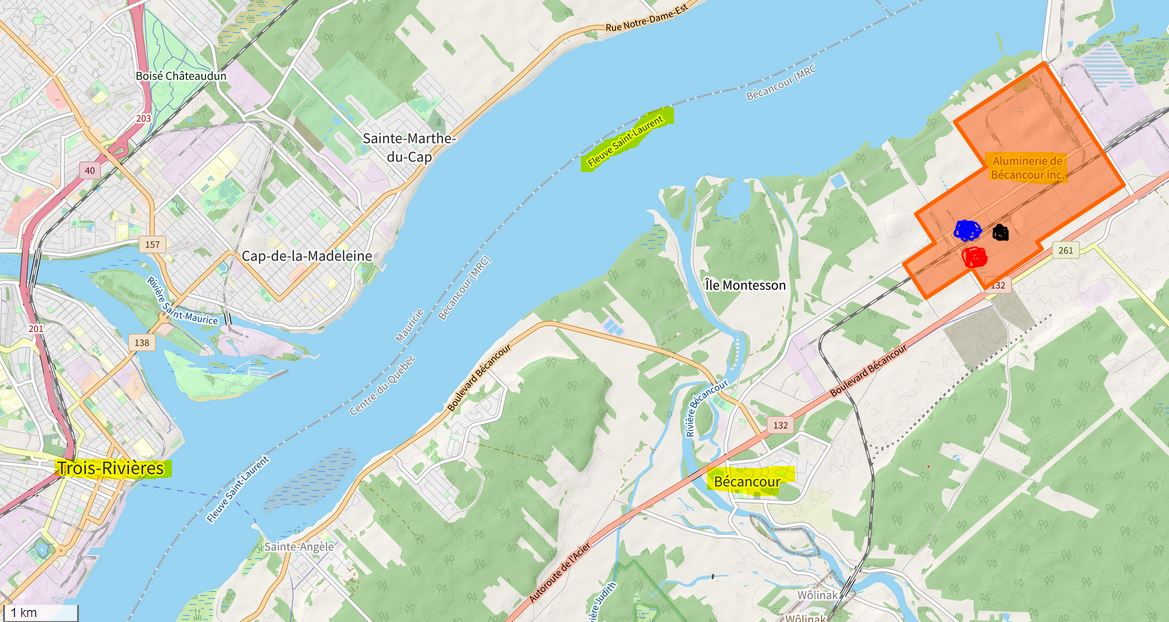 Map showing location of GM-POSCO (red),
Ford-ECOPRO (blue) and Nemaska (black) plants in construction in
the Bécancour industrial park.
Map showing location of GM-POSCO (red),
Ford-ECOPRO (blue) and Nemaska (black) plants in construction in
the Bécancour industrial park.
Canada's Pay-the-Rich Mechanisms Still in Place
The Canadian and Quebec governments have promised oodles of money for the building of these plants. Together, both governments promised more than half of the money needed to build Ford-ECOPRO's Bécancour plant, loans of $644 million for the construction of the $1.2 billion plant. The "forgivable" portion of Quebec's loan amounts to $194 million, the equivalent of a subsidy.[3]
On October 31, Ford announced that it was withdrawing from the cathode factory project in Bécancour. Construction was put on hold at least twice in 2024 because of lower than expected sales of EVs and issues related to the manufacturing technology to be used to produce the material component of battery cathodes. The majority partner in the Bécancour plant project, south Korean ECOPRO, is now looking for a new business partner. The plant is expected to produce its first cathodes in the first half of 2026, reaching a capacity of 45,000 tons of active material per year.
Reasons for Rio Tinto's Purchase of Arcadium Lithium
Rio Tinto Chief Executive Officer Jakob Stausholm said: "Acquiring Arcadium Lithium is a significant step forward in Rio Tinto's long-term strategy, creating a world-class lithium business alongside our leading aluminium and copper operations to supply materials needed for the energy transition."
On Rio Tinto's website, it says that "Rio Tinto and Arcadium have complementary footprints and deep experience in Argentina and Quebec, where Rio Tinto expects to establish world-class lithium hubs with clear opportunities for sharing skillsets and reducing costs."
"The hard rock opportunities in Canada are very attractive to us," Rio Tinto CEO Stausholm said in a conference call with analysts. "For 20 years, Rio Tinto monitored not just the company [Arcadium], but the entire industry, looking for the right time to buy," he said.
What he is referring to is that lithium can be extracted from a mineral called spodumene, a lithium-aluminum silicate that needs to be mined from hardrock such as that found in Quebec and provinces in Canada.
At the same time, it is known that Arcadium has expertise in direct lithium extraction (DLE), a growing segment of the lithium industry that mechanically filters the metal from brines in the form of lithium carbonate. As Reuters reported on October 4, "No company has commercially launched a DLE process without evaporation ponds, but Arcadium has successfully been using DLE since the 1990s with ponds in Argentina and its engineers are widely seen as global experts. Rio paid $825 million in 2022 for a DLE project in Argentina that has yet to produce the metal."
For Rio Tinto it was the right time to buy Arcadium Lithium. The world market price for lithium is at an average of U.S.$15,000 per ton, a huge drop from its historical peak of about U.S.$75,000 per ton in January 2023. Rio Tinto's offer to buy Arcadium Lithium was at a market share price that was 50 per cent lower than it had been at the beginning of the year, before the share price started to plummet.
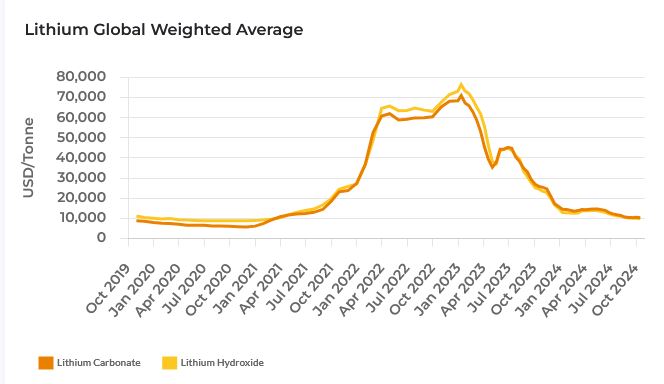 Evolution of the world price of lithium
carbonate (orange) and lithium hydroxide (yellow), 2019-2024
Evolution of the world price of lithium
carbonate (orange) and lithium hydroxide (yellow), 2019-2024
(source: The Logic)
Notes
1. See "Multi-Million Dollar Partnership Between Hydro-Québec and the U.S. Army", TML Daily, No. 52, December 2, 2022.
2. On May 16, Natural Resources of Canada and the U.S. Department of Defense (DoD) announced they were investing $4.9 million and U.S.$8.4 million respectively in Lomiko Metals to develop a graphite mineral deposit located near Duhamel in Southwestern Quebec, along with similar funding from the same Canadian and U.S. agencies to develop a cobalt-bismuth mine in the Northwest Territories.
On September 26, the DoD announced $18 million in funding for a British Columbia company called Nano One Materials. The company has set up a pilot plant in Candiac, south of Montreal, to produce lithium iron phosphate (LFP), the only plant of its kind in North America. LFP is the active material in the cathodes of rechargeable lithium-iron-phosphate batteries.
As far back as 2016, the U.S. Army Research Laboratory (ARL) gave Hydro-Québec nearly $10 million for research and development of a portable rechargeable lithium-cobalt-phosphate battery. This was built in 2018 as per the Pentagon's specifications.
3. See "More Pay-the-Rich Schemes in the Name of Creating a 'Sustainable Quebec Economy,'" TML Monthly, March 2024.
(With files from U.S. government, Canadian Government, Quebec Government, Rio Tinto, TML, Reuters, The Logic, La Presse, Journal de Montréal)
Aim of Making Quebec a "World-Class Lithium Hub"
In announcing that the mining giant Rio Tinto plans to establish "world-class lithium hubs" in Quebec following its U.S.$6.7 billion deal to buy Arcadium Lithium, CEO Jakob Stausholm said in an October 9 conference call with analysts: "The hard rock opportunities in Canada are very attractive to us." He added: "For 20 years, Rio Tinto monitored not just the company, but the entire industry, looking for the right time to buy."
A number of specialists believe the deal is a game-changer for the lithium industry, easing doubts that mounted as electric vehicle (EV) sales growth slowed and other battery technologies came on the market. According to RBC Capital Markets analysts, "this makes Quebec an ideal location for supplying the growing electric vehicle market in North America."
"We are extremely keen to find ways to accelerate the projects," said Arcadium CEO Paul Graves, "and within Rio, we can." Arcadium, along with Investissement Québec, is co-owner of beleaguered Nemaska Lithium and had previously paused a second Quebec project while it looked for investors.
Still, according to financial analysts, in a context of automakers delaying plans to make EV batteries, the Rio Tinto acquisition will encourage larger mining companies and energy companies in the world to look at Canadian assets. They claim that Rio has been one of the few mining conglomerates in recent years that expressed "bullish sentiment around lithium."
Nemaska Lithium, Case in Point
Less than a week after Ford's October 31 announcement that it was withdrawing from the battery cathode plant project in Bécancour, Quebec's Minister of Economy, Innovation and Energy, Christine Fréchette, went to Bécancour to offer reassurance to foreign investors. There, on November 6, she announced that the Quebec government is doling out another $250 million to Nemaska Lithium, which is 50 per cent owned by Investissement Québec, the government's "investment arm." She said, "With the battery industry, we are consolidating our nation's position as a leader in the energy transition, as well as creating well-paying jobs for Quebeckers. We're continuing our work to develop a strong battery industry that will enrich and decarbonize Quebec!"
This same message has become the Coalition Avenir Québec (CAQ) government's mantra: pay-the-rich schemes for narrow foreign private interests are needed as a way of building a leading edge "sustainable economy." Investissement Québec's website reports: "The investment of $250 million is part of the government's commitment to develop Quebec's battery industry and support the sustainable growth of our economy. Future spin-offs will enable the government to invest in services for the population, particularly in health and education."
Such statements do not even fool the gullible.
Prior to being acquired by Arcadium Lithium and now Rio Tinto, the Whabouchi deposit's owner, Nemaska Lithium, had emerged from creditor protection in August 2020 under the joint ownership of Investissement Québec; Pallinghurst Group, a UK-based mining and metals private equity firm; and Orion Mine Finance, a U.S.-based mining and metals private investment firm.[2]
Besides putting $80 million of public funds in the Nemaska Lithium private mining and metallurgical venture in May 2018, the Quebec government again came to its rescue in 2020 by buying it back, along with Orion and Pallinghurst. It also paid back a huge portion of the $146.54 million in liabilities owned in part by Orion.
The Quebec government also put in another $200-300 million of public funds to retain Pallinghurst as a "partner" in the rescue package. Many small investors who put their life savings into this venture lost everything when Nemaska Lithium filed for bankruptcy.[3]
 Location of the port serving the Bécancour (Quebec)
industrial park
Location of the port serving the Bécancour (Quebec)
industrial park
The fact that critical minerals such as lithium, copper, nickel and now graphite are being mined in Quebec under foreign ownership did not stop Premier François Legault from declaring, in his speech inaugurating the CAQ government's first term: "In Quebec, we need important companies that are owned by Quebec interests."
It seems that critical minerals such as lithium and graphite are not important enough for him to consider part of "Quebec's green sustainable economy."
Claiming that his government is "creating more wealth for Quebec," Legault is bending over backwards to support private foreign interests that are mining critical minerals with all kinds of pay-the-rich schemes. These are in the form of direct state grants and subsidies, interest-free loans, infrastructure such as roads, hydro power and, in the future, new railroads. For example, the Qc Rail project currently being studied would link the trans-Canada railway system at Senneterre, in Abitibi, to Baie-Comeau, a deep-sea port facility on Quebec's North Shore.[4]
Rio Tinto and other global mining conglomerates, such as BHP and Glencore, are in a race to put their greedy paws on as many critical mineral projects related to lithium as they can. This is because huge pay-the-rich schemes are being put forward by the likes of the U.S., Canadian and Quebec governments, claiming high ideals, like "greening" the economy and "national security," instead of building an economy that serves the needs of the people.[5]
The people of Quebec and Canada do not subscribe to such an outlook that disinforms on what the real issues are when it comes to fighting for a bright future for themselves and for all of humanity. More specifically, they reject this notion that a "green" economy means that Quebec and Canada's economies should be integrated into the U.S. war machine or be subject to pay-the-rich schemes.
Notes
1. "Rio Tinto just put lithium M&A officially in play -- a jolt for the industry, and potentially big news for Canada," by Anita Balakrishnan, The Logic, October 10, 2024.
2. See "Bailouts of Private Mining and Metallurgical Ventures," TML Weekly, October 24, 2020.
3. See "Quebec Agenda for a 'Green Economy' -- A Formula for More Sellout -- Enriching Private Foreign Interests and Strengthening Anglo-American Global Domination," Fernand Deschamps, Renewal Update, December 17, 2021.
4."Transportation Infrastructure Program, Feasibility Study, Phase I and Prefeasibility Study, Phases II-III," Cree Development Corporation, La Grande Alliance, March 20, 2020, p. 80.
5.
See "Direction Legault Government Has Set for Quebec Economy:
Processing Critical Minerals in Bécancour Region," Pierre
Chénier, TML Daily, December 3, 2022.
(With files from Quebec government, TML, Radio-Canada, The Logic, La Presse, Journal de Montréal)
Benefits to Rio Tinto of
Canada's
Pay-the-Rich Schemes
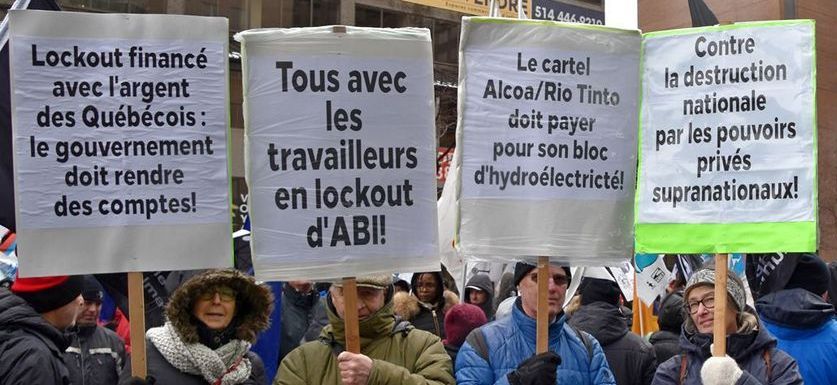
Placards from Montreal action during lockout of Bécancour
aluminum smelter workers,
November 28, 2018
Rio Tinto is no stranger to receiving subsidies from the Canadian and Quebec governments for its operations in Quebec. What is that about?
Rio Tinto's Chairman, Dominic Barton, is well versed in the subject. In 2019 Prime Minister Justin Trudeau appointed Barton, who was global managing director for McKinsey and Company until 2018 and Chairman of Teck Resources Ltd. from 2018 to 2019 -- as Canada's Ambassador to the People's Republic of China. This appointment by Trudeau set a new record for government's patronage appointments to the diplomatic service. Rio Tinto itself has been the recipient of government handouts many times in the past.
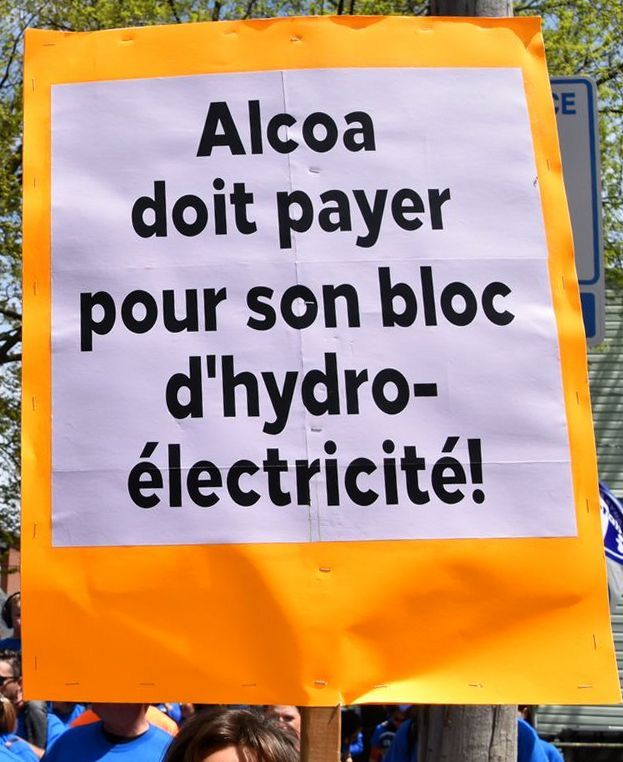 In 2018-19, during the more than
13-month lockout of workers at the Bécancour aluminum smelter
(ABI) owned by the Alcoa and Rio Tinto cartel, the Quebec
Liberal government of Philippe Couillard allowed ABI to forgo
$108 million in payments to Hydro-Québec for its allocated block
of energy. The reason given was that the contract between the
government, Hydro-Québec and ABI stipulated, among other things,
that a strike or lockout is a case of "force majeure" or an "Act
of God" that releases the company from its obligation to pay for
the block of energy reserved for it, even though this block had
already been planned and produced.
In 2018-19, during the more than
13-month lockout of workers at the Bécancour aluminum smelter
(ABI) owned by the Alcoa and Rio Tinto cartel, the Quebec
Liberal government of Philippe Couillard allowed ABI to forgo
$108 million in payments to Hydro-Québec for its allocated block
of energy. The reason given was that the contract between the
government, Hydro-Québec and ABI stipulated, among other things,
that a strike or lockout is a case of "force majeure" or an "Act
of God" that releases the company from its obligation to pay for
the block of energy reserved for it, even though this block had
already been planned and produced.
In 2018, the governments of Quebec and Canada each gave Rio Tinto $80 million to develop the Elysis technology, which involves producing aluminum without emitting greenhouse gases. Initially, Elysis was due to come on stream in 2024, but the project has now been pushed back to 2030-31. Rio Tinto promised in 2023 that its Alma plant in Quebec would benefit from the Elysis process on condition that it received an additional 600 megawatts of power.
Critics said that the other major producers in the global aluminum industry have never succeeded in developing such a technology on an industrial scale. Premier Legault responded to them in June 2023 regarding the Elysis process, saying that he was "prepared to take that risk" with Rio Tinto. His government announced in June this year that Rio Tinto and Investissement Québec were setting up a limited partnership using the first technology licence issued by the ELYSIS joint venture. Rio Tinto is putting in $235 million, while the financial arm of the Quebec government is contributing $140 million.
In 2021, Rio Tinto received a grant of $850,000, including $500,000 from the Ministry of Energy and Natural Resources and $350,000 from the Ministry of the Economy and Innovation, to develop a process for extracting scandium oxide from its mine tailings. Scandium, as an alloy with aluminum, is considered a strategic mineral for the military aerospace industry. Pierre Fitzgibbon, the Minister of Economy and Innovation at the time, said: "It's symbolic [the subsidy]. We want to send a signal to Rio Tinto, a London-based company, that we are going to be there to support the development of critical and strategic minerals."
On October 11, 2022, during a visit to Rio Tinto's Sorel plant, Trudeau and Innovation, Science and Industry Minister François-Philippe Champagne announced federal government grants of $222 million to Rio Tinto to proceed with "the electrification of furnaces and the replacement of coal" for the "decarbonization" of the plant. Located less than 100 kilometres upstream from Bécancour, the plant processes titanium ore from Havre St-Pierre to extract titanium dioxide and scandium oxide, two other strategic minerals that also have military applications. Rio Tinto has already announced that it will also proceed with refining lithium at the same plant from a number of international sources "if the conditions are right."
In June, the Quebec government announced financial assistance in the form of preferential loans of up to $150 million to enable Rio Tinto to install 96 new potlines at the Jonquière aluminum smelter in Saguenay, a $1.4 billion project.
Even more recently, in July Quebec's Ministry of the Economy, Innovation and Energy announced that it was buying the Thurso cellulose plant in the Outaouais region, which was owned by Fortress Global, a company that declared bankruptcy in December 2019 after ceasing operations in October 2019, resulting in the layoff of more than 300 workers. The mill was forced to suspend operations due to excess inventories and the fall in the price of cellulose pulp on the world market. Since 2010, the Quebec government has invested more than $107 million in the former pulp and paper mill and will be spending at least another $25 million to decontaminate the site.
The site decontamination was demanded by Évolys, a joint venture formed by the multinational Rio Tinto and its U.S. partner, Aymium, as a condition for it to build a metallurgical biocarbon plant on the site -- a $50 million project. Made from forest residues, this biocarbon, also known as biochar, could replace coke in the production of certain metals, including titanium, at Rio Tinto's Sorel-Tracy plant, as part of its plan to "decarbonize" its operations by sequestering carbon dioxide. The new Minister of the Economy, Innovation and Energy, Christine Fréchette, declared on September 9 that "the requalification of the [Thurso] plant by Évolys Québec, in addition to contributing to the decarbonization of our metallurgical companies, is furthering the development of the Quebec economy. It's a win-win situation!"
Fréchette needs to explain what it is that Quebeckers have won in this transaction, and with other subsidies given to Rio Tinto. In July, the government assumed all the risks and costs by becoming the owner of the facilities as part of Fortress Global's bankruptcy proceedings. Évolys will lease part of the premises, but will not pay any rent to the government.
(With files from TML, Workers' Forum, Radio-Canada, La Presse, Journal de Montréal)
All Out to Defend the Rights of All
Broad Opposition to Canada's
New
Immigration and Refugee Cuts
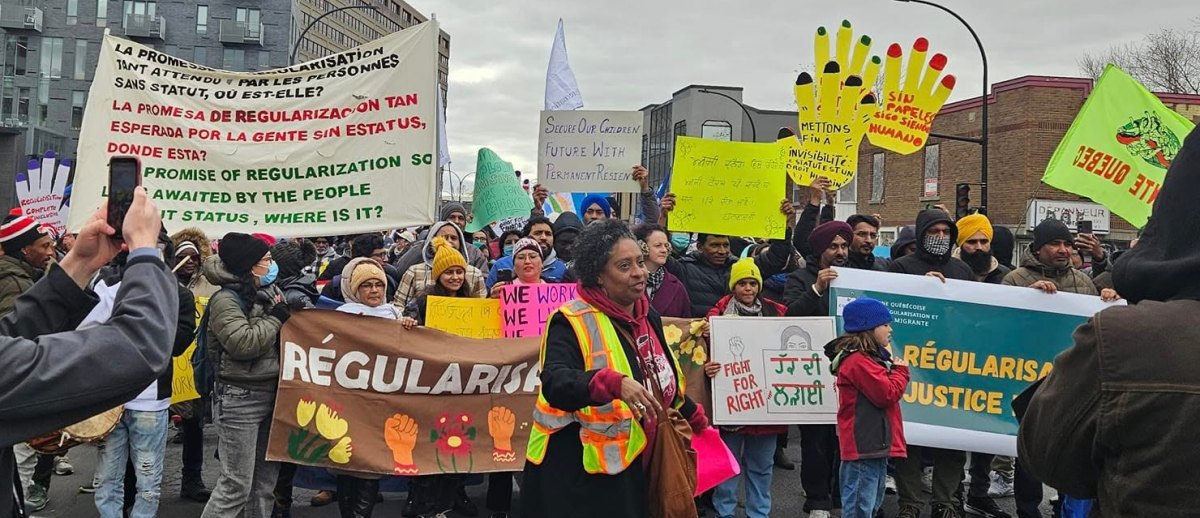
Migrant rights demonstration in Montreal, November 2, 2024
No sooner had Immigration Minister Marc Miller announced drastic changes to Canada's Immigration and Refugee system on October 24 this year, than his plan was opposed widely across the country. This is the first reduction in immigration and refugee levels since the Trudeau government came to power in 2015.
In trying to justify these drastic cuts that take effect immediately, Minister Miller said, "While it's clear our economy needs newcomers, we see the pressures facing our country, and we must adapt our policies accordingly. These changes will make immigration work for our country so that everyone has access to the quality jobs, homes and supports they need to thrive. We have listened to Canadians, and we will continue to protect the integrity of our system and grow our population responsibly."
Migrant defence organizations, advocacy groups, trade unions and experts denounced the government's bogus argument that the drastic cuts would alleviate "pressures on housing, infrastructure and social services so that over the long term we can grow our economic and social prosperity through immigration," as Minister Miller claimed. They stood as one to oppose these racist policies that falsely target immigrants and refugees for the problems of the anti-social offensive of the rich and their governments against the Canadian people.
Up to 2.3 million people in Canada whose work or study permits will expire by the end of next year will be forced to either leave Canada or become undocumented. Tens of thousands of international students have indebted themselves and their families, having to pay extortionate tuition fees, as well as being exploited by slumlords for substandard housing. Likewise, workers who have spent thousands of dollars in application, transportation and processing fees to come to Canada under the Temporary Foreign Worker Program are now also thrown under the bus because their plans have been upended. Many people who have applied for asylum in Canada will also be excluded.
Added to this situation is the baseless and racist hysteria from the incoming U.S. Trump administration about "border security" and migration, and threats of mass deportations. This is being taken up by federal and provincial governments and monopoly media as if it has legitimacy, and will be further used to attack rights and integrate Canada into the U.S. war machine, to the detriment of all who study, live and work in Canada.
Syed Hussan, spokesperson for the Migrant Rights Network, a coalition of more than 100 labour, migrant rights and human rights groups, said: "We are witnessing a disgraceful assault on migrant rights in Canada as this government continues to scapegoat migrants for the housing and affordability crisis. The Liberals, desperate to claw back their sinking poll numbers, had already slashed over 775,000 study and work permits ... The government must abandon this dangerous path of using immigrants for political football, focus on rights instead of just numbers, and end the exploitation and abuse of migrants by ensuring permanent resident status for all."
Addressing the false claims that immigrants are to blame for the housing and affordability crisis, Hussan added: "The population grew by just 3.9 per cent over two years, yet rents exploded by 20 per cent -- it is clear that migrants are not the cause. Instead of addressing corporate profiteering and systemic failures, this government is shamefully deflecting blame onto migrants. This is not just dishonest -- it's deeply harmful and reckless."
Novjot Salaria, an organizer with the Najuwan Support Network, a defence organization for international students in Brampton, Ontario which has held a permanent encampment in downtown Brampton since the end of August protesting Canada's exploitation and abuse of international students, noted that reducing permanent resident targets will limit the number of international students who hold the Post Graduate Work Permit from applying through the government's Express Entry System to be permanent residents in Canada. "There is already a backlog with a huge number of people waiting," she said. "Reducing the numbers means there will now be even less chances for people who are already in the permanent residency pool to be approved." It is patently unjust she said and called on the government to reverse its changes.
The Canadian Council for Refugees (CCR), a Montreal-based umbrella organization defending refugee rights said on October 25: "[I]n a shameful abdication of responsibility, the Canadian government has massively reduced its commitment to offer protection to those fleeing persecution and danger in the world, and all but ensured that refugees in Canada will remain separated from their spouses and children for years to come. The CCR condemns today's announcement and calls on the government to reverse this dangerous course."
Diana Gallego, CCR President, noted: "Behind the numbers slashed from the humanitarian component of the levels today are over 14,000 real people fleeing persecution and seeking safety in Canada or struggling in conflict zones around the world facing violence, starvation, and death. It particularly fails those already here whom we have committed to protect and their family members abroad ...It is not an exaggeration to say that the action taken today will rob children of their futures and destroy families. People will lose their lives."
International Migrants Alliance (IMA) Canada, part of an international network of defence organizations of migrant workers, opposed the immigration and refugee cuts which it says will mean "that many temporary residents, from migrant workers, asylum seekers, refugees and the undocumented will remain with precarious status and consequently open to abuse." They emphasize that the measures being introduced have nothing to do with "too many migrants" but rather with "an economic and political crisis rooted in the imperialist structure of Canada's social system." The organization also notes that Canada contributes to global political and economic conflicts that "massively displace millions of people around the world."
IMA Canada demands that the Canadian government "end the scapegoating of international students, refugees, and migrant workers." It demands that Canada must take responsibility for its role in displacing people globally and stop using migration as a tool of capitalist extraction. IMA Canada underscores that it stands as one with all workers in Canada to oppose a system that exploits all workers, and urges all migrants as part of the working class to hold rallies, forums, and others actions building towards December 18, the UN International Migrants Day, to highlight the contributions of migrant workers and the struggle to defend their rights and the rights of all workers.
A November 25 article critiquing a slick newly released video in which Prime Minister Trudeau "explains" his government's new immigration changes, observes that it "paints an incomplete picture and perpetuates misleading narratives on Canada's immigrant selection, higher education and asylum systems." Academic and immigration expert from the University of British Columbia, Lisa Ruth Brunner, points out that the video aims to shift the blame for the immigration crisis for which the Trudeau government itself is responsible. She notes that in the video "Trudeau's strongest criticism is reserved for 'really bad actors who outright exploit people' and 'target vulnerable immigrants with promises that would never come true."' Dr. Brunner asks rhetorically, "Is he describing his own government?"
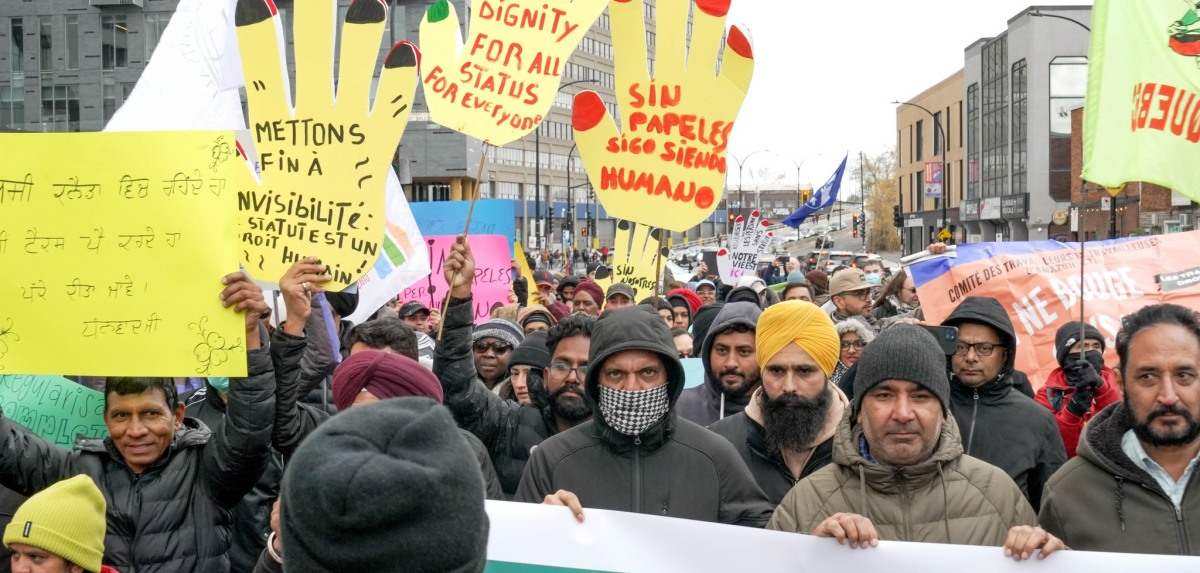
Montreal, November 2, 2024
(With files from Migrant Rights Network, Canadian Council for Refugees, IMA Canada, Brampton Guardian, The Conversation. Photos: iwc-cti, M. Henaway )
Canada Needs a Just and Modern
Immigration Policy that Upholds Rights by Virtue of
Being Human
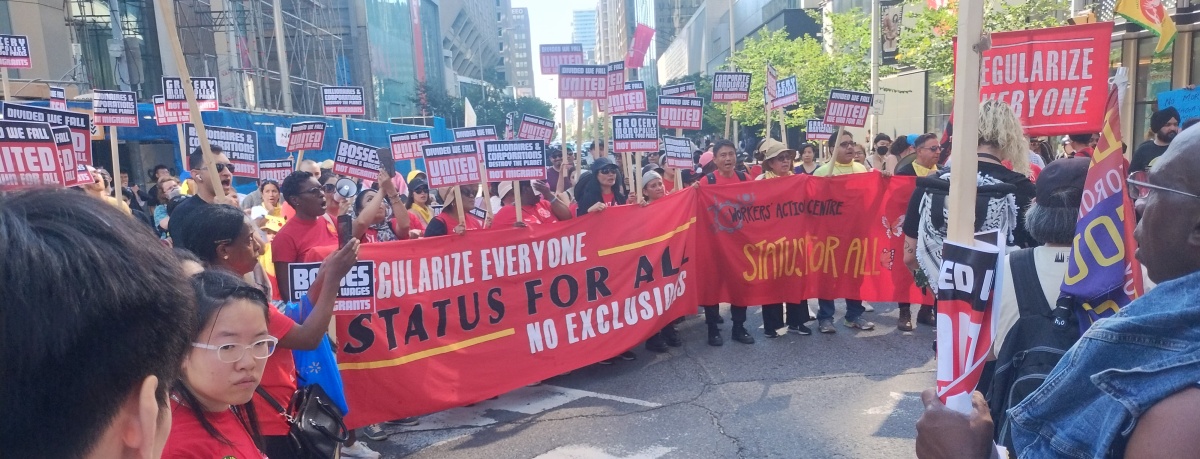
Status for All action,
Toronto, September 15, 2024
The Trudeau government's announcement on October 24 of its new transitional Immigration Levels Plan for 2025-2027 includes an overall reduction of permanent immigrants to Canada by 21 per cent in 2025 and other arbitrary changes. These changes will create chaos and turmoil in the lives of international students, temporary foreign workers and refugees already in Canada and thousands of others who were planning to come to Canada. This is an attack on the Canadian people aimed once again at blaming immigrants, international students, temporary workers and asylum seekers for the consequences of the anti-social offensive of the oligarchs who have taken over government and are driving policies that deprive people of basic rights. The impact of these cuts will have severe consequences for hundreds of thousands of people.
Minister of Immigration, Refugees and Citizenship Marc Miller stated on October 24, "In response to the global pandemic and labour shortages, we brought in temporary measures to attract some of the world's best and brightest to study and work in Canada, which supported the urgent needs of businesses." The plan worked, he said, to facilitate the recovery of the Canadian economy in the pandemic. But now, "pressures on housing and social services require a more sustainable approach to welcoming newcomers."
In other words, the estimated 3 million non-permanent residents in Canada, representing close to seven per cent of Canada's population of 41 million, are causing the "pressures on housing and social services," not the total abdication by the Canadian state of its responsibility to provide the right to housing, employment, health care and other rights with a guarantee. This number is to be reduced to five per cent of the population over the next three years.
Since 2008, both Conservative and Liberal governments have brought more temporary residents than permanent immigrants into Canada. This deliberate policy is to deprive migrants of rights and make them more vulnerable to exploitation.
The government's cuts to immigration include reducing the number of permanent residents immediately from a target of 500,000 in 2024 to 395,000 in 2025, from 500,000 to 380,000 in 2026, and setting a target of 365,000 in 2027. This will be done through cuts to the economic immigration category and the family reunification category. It was announced that next year 40 per cent of temporary residents who are young, educated and skilled will be processed for permanent residency. Miller noted that this group of immigrants is already in Canada and have begun their integration, and therefore "will not place the burdens on our housing, health care and social services of someone who comes in from another country."
In terms of cutting non-permanent migrants to Canada, the main cuts will come in the number of international students who are eligible for work permits which could lead to permanent resident status. It was announced that since the government reduced the number of study permits issued to international students by 43 per cent since last year, housing costs in Vancouver and Toronto have gone down -- which the immigration minister says proves that the Liberal plan is working. Miller added that thanks to these reductions "we will not have to build an additional 670,000 housing units by [2027]." The government expects that the number of temporary residents in Canada will decline by about 445,000 in 2025 and by another 445,000 in 2026, and will then increase by about 17,000 in 2027.
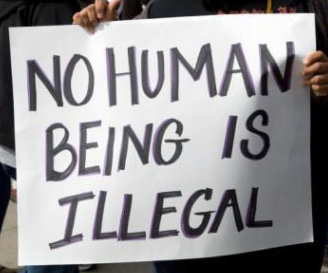 The government reports that, as
of February 2024, with regard to the number of undocumented
immigrants in Canada "estimates from academic sources range
between 20,000 and 500,000." Speaking of a regularization
program for undocumented immigrants that the Trudeau government
pledged in December 2021, Miller repeated that there was "no
consensus" in Canada to offer "mass regularization" as his
"mandate letter" has instructed him to pursue. However, he
stated that Canada will pursue a small regularization program
for those working in services such as health care and
construction.
The government reports that, as
of February 2024, with regard to the number of undocumented
immigrants in Canada "estimates from academic sources range
between 20,000 and 500,000." Speaking of a regularization
program for undocumented immigrants that the Trudeau government
pledged in December 2021, Miller repeated that there was "no
consensus" in Canada to offer "mass regularization" as his
"mandate letter" has instructed him to pursue. However, he
stated that Canada will pursue a small regularization program
for those working in services such as health care and
construction.
Canada has obligations under international law to support refugees and asylum seekers and has made promises to international students and migrant workers who worked in health care and other sectors during the pandemic, all of which are tossed aside with these announcements. The government and cartel parties and media who blame immigrants for the housing crisis and pressures on social programs, treat all workers in Canada, including immigrant workers, as things to be used when needed, exploited, and then discarded when not, not as human beings with rights that society must guarantee.
It is the anti-social offensive of the rich and their governments at all levels that has caused the crisis in housing, health care and other services for which the cartel parties are blaming immigrants. During the economic crisis of the mid-1970s, in order to split the working class and people, the Pierre Trudeau Liberal government introduced the Green Paper on Immigration which sought to restrict immigrants from South Asia and the Caribbean on the racist basis that Canada had "limited absorptive capacity" for immigrants with "novel and distinctive features." Canadians rose up across the country to denounce the Green Paper and defend the rights of all. They are doing so today as well to oppose the mistreatment of international students, migrant workers and refugees.
The arbitrary and inhumane changes called a "plan" that Canada announced on October 24 are aimed at diverting attention from the crisis in which Canada's liberal democracy and its institutions are mired. It is noteworthy that for decades the rights of international students, temporary foreign workers and refugees have been violated with impunity. With this announcement, it is clear that the Canadian state is going to continue these violations in the name of defending Canada's interests and upholding the "integrity" of Canada's immigration system. These new immigration announcements are inhumane and self-serving, dividing the people and diverting attention from the wrecking that is going on through the privatization of housing, health care, education and other social programs to benefit the rich while denying the state's responsibility for the well-being of all the people.
Canadians want the
state-organized attacks against immigrants, refugees,
international students and those without status to end. The
situation calls for continued united opposition to these
arbitrary and self-serving policies which are aimed at
exploiting and abusing workers on the basis of their status, and
maintaining conditions of modern day slavery to attack the
living and working conditions of all working people in Canada.
None of the cartel parties uphold humane and just immigration policies that recognize that people have rights by virtue of being human and that government must uphold those rights. Only the working class, of which migrant workers are an integral part, through its consciousness and organization, can bring into being the new arrangements needed to ensure that the rights of international students, temporary foreign workers and refugees are guaranteed.
(With files from IRCC, Migrants Rights Network, CPAC)
Immigrant Rights Organizations Demand Government Reverse Immigration Cuts
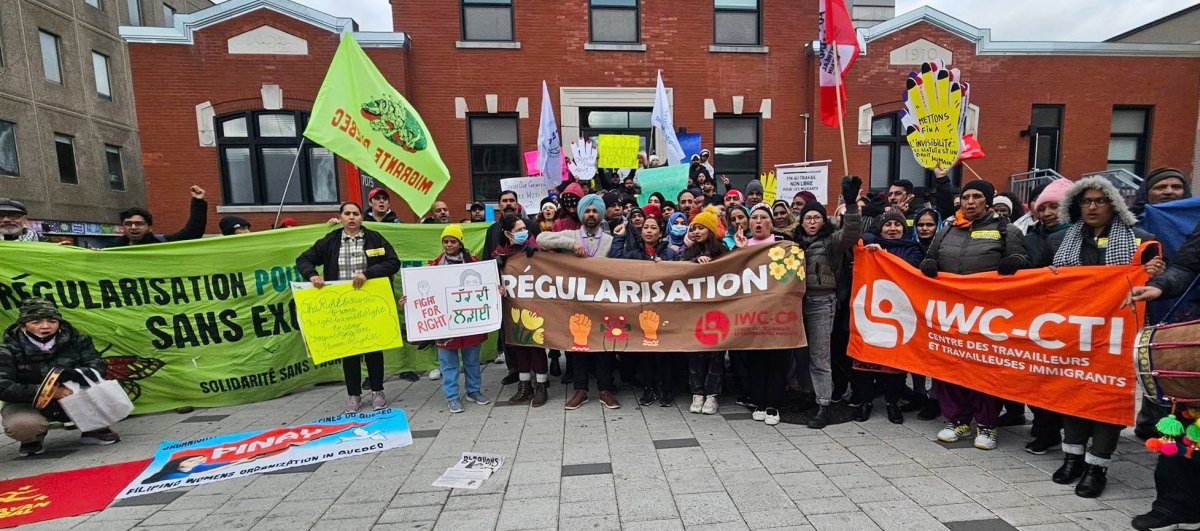
Montreal, November 2, 2024
The Migrant Workers Alliance for Change held a press conference at the House of Commons in Ottawa on November 25. That same day Immigration Minister Marc Miller appeared before the Standing Committee on Citizenship and Immigration to answer questions about his 2024 report to Parliament on immigration.
Responding to drastic changes announced on October 24, emcee Karen Cocq noted that more than 180 migrant rights, community and social justice organizations, representing 5.8 million people, sent an open letter to the Trudeau government calling for the government to halt its anti-immigrant measures.
Sarom Rho, spokesperson for the Migrant Rights Network, Canada's largest coalition of migrant-led rights groups defending the rights of farm workers, care workers, former international students and the undocumented, condemned the massive cuts to immigration over the last 18 months as "unjust, racist and unwarranted." She said that the result would be the expulsion of 2.3 million people from Canada over the next two years and that the changes would multiply the immense power imbalance that employers, landlords, and recruiters have over migrants and undocumented people. She pointed out that the Trudeau Liberals have promised many times over the last nine years to bring in a regularization program but they have not kept their promises. She underscored that migrants are "more than numbers on a table or figures to be used as election bluster or taps to be turned on or off at the Prime Minister's whim." She demanded that Trudeau and Miller reverse the anti-immigrant cuts, ensure regularization for all undocumented workers, and permanent status for all migrants, and fund housing, health care and social services for the benefit of all citizens and residents of Canada.
Rho denounced the "divide and distract" tactics of governments and media, which blame immigrants for social problems to hide the fact that "the super rich are making record-breaking profits while the majority of us go hungry, that corporate landlords are buying up housing stock to manufacture scarcity and that the public institutions we value so deeply like health care and education are being chopped up and sold by the pound to private profiteers." She said migrant workers contribute to growing the economy and quoted Minister Miller himself who said that regularizing undocumented workers would contribute more to the public purse than any oil pipe-line would.
Michèle Biss, project manager of the Right to Housing Network denounced the claim of the Trudeau government that drastic cuts to immigration are necessary to address the housing crisis. She noted that "Canada's housing crisis experts have told government time and time again that the housing crisis is driven by factors like under-investment in non-market housing such as social non-profit and cooperative housing and lack of regulation of investors who treat housing as a commodity rather than as a human right and a severe lack of protections for renters experiencing rent evictions.... Migrants, international students, refugees, temporary foreign workers and undocumented people are not responsible for Canada's housing, economic or infrastructure challenges."
Monieya Jess, an undocumented worker who came to Canada to work to support two sons in her homeland, described what happened to her after being mistreated and injured working at a strawberry farm in Nova Scotia. She left the farm and became undocumented, she was turned away from a hospital and denied medical treatment because she had no health card, while struggling to find a job. "Without papers we are blowing in the wind... Our families depend on us but nobody will hire us ...We deserve fairness and equality. We are demanding status for all and an end to deportations. ... I want Prime Minister Justin Trudeau to act on his promise of regularization made nearly three years ago. He knows it is good for the economy and it is good for migrants."
Navjot Salaria, a member of the Post-Graduate Work Permit Holder Committee of the Naujawan Support Network spoke of the experience of tens of thousands of international students: "I came to Canada in 2021 as an international student. After studying at York University I got a post-graduate work permit and I started working in an IT company at a big bank. I am one of 200,000 postgraduate work permit holders in Canada whose work permits are expiring in 2024 and 2025.
"International students were sold the Canadian Dream by governments, colleges, universities and their recruiters with the slogan: 'Study, Explore, Work and Stay.'" On the basis of these promises, she said, families sold land and took on debt to pay high tuition fees and living costs. Now, as a result of changes to immigration policies, their security is gone and thousands are in limbo, with students whose work permits are expiring told to apply for visitor visas, buy bonded labour contracts, and even apply for refugee status.
International students, Salaria said, are human beings with dignity who will continue to fight for their rights. "At the heart of this issue is whether Canada chooses to treat international students and immigrant workers with respect for their labour and contribution to this country's economy or as a disposable item to be used, scapegoated and discarded. From the Komagata Maru to the Chinese Head Tax we have historical evidence of Canada's racist immigration policy and system. We hope that Canada will not have to apologize for its actions 100 years from now just as it did for the Komagata Maru," she said. Salaria called on the Trudeau government to extend post-graduate work permits and ensure a fair pathway to permanent residency for international students.
Diana Gallego, president of the Canadian Council for Refugees, denounced the government's massive reduction to its commitment to provide protection to those fleeing persecution and danger. She said this is further complicating family reunification for refugees in Canada, who will remain separated from their spouses and children for years to come. She said that cuts to the number of allowed humanitarian applications are deep. Only the Government Assisted refugee category has remained the same as announced last year, which is "a drop in the bucket of the growing number of displaced people around the world" and far below Canada's capacity to resettle refugees, she said.
Cutting 5,000 refugee applicants sponsored by private citizens is baffling, Gallego said, because those costs are borne entirely by the private sponsors. The number of refugees who are privately sponsored outnumbers those who are government-sponsored. Besides demanding that these cuts be reversed, the Canadian Council for Refugees is calling on the government to withdraw from the Safe Third Country agreement with the U.S., "so that people can seek asylum without losing their lives."
The last speaker, Viviana Medina from the Immigrant Workers' Centre in Montreal, reiterated the call that the government's racist anti-immigrant policy changes be reversed, that migrant workers and international students to be treated with dignity and respect, for an end to deportations and detention, and for regularization for all. She appealed to migrant rights organizations and their allies across Canada and Quebec to organize actions on December 18, International Migrants Day. She called on them to mobilize and inform through discussion in meetings and public forums, petitions and other actions in support of these demands and in recognition of the contributions of migrants to Canadian society.
(Photo: M. Henaway)
Information on Sector-Specific Work Permits
The federal government is preparing to introduce sector-specific work permits for certain streams of the Temporary Foreign Worker Program (TFWP) in early 2027. Last March, it announced a new stream of temporary foreign workers programs for the agriculture and fish processing sectors. Consultations on the proposed reform, about which very little has been made public, are currently underway. These permits are being touted as a means of offering greater freedom and mobility to workers than the much-criticized closed work permit.
As part of the decades-long fight of migrant workers and their advocates in defence of their human rights, a panel discussion was organized on October 3 on the topic. It was hosted by Amnistie Internationale Canada Francophone and the Association for the Rights of Household and Farm Workers (RHFW), which is currently leading a class action lawsuit against closed work permits, that was recently authorized by the Superior Court of Quebec.
The event kicked off with the RHFW's Hannah Deegan, a lawyer, explaining that based on Employment and Social Development Canada's own calculations, over 100,000 positions that presently fall under the TFWP will be affected by the reform.
She explained that one of the reform's main objectives is to streamline the program's requirements for the two targeted sectors, as at present, each of the TFWP's agricultural sub-streams operates with separate rules and operations. The intent is also to standardize the rules for employers, while extending the many employer benefits found in the agriculture sector to the fish processing sector. The new component would also allow workers to change employers, providing the job has a valid labour market impact assessment (LMIA).
Noteworthy is the fact that the new stream announced by the government covers a range of jobs, including both permanent and seasonal positions.
The Three Panelists
Rachel Dempsey is a lawyer, whose practice focuses on worker representation and economic justice advocacy. She represents many nurses in the United States who hold sectoral visas and are subject to contracts that penalize them when they change jobs, as well as workers in various other sectors who are subject to coercive contracts.
Nicolas McGeehan, in France, is an investigator and advocate on migrant workers' rights and support. He has conducted research on a wide range of issues, including abuses in agricultural supply chains.
Caroline Robinson, from Scotland, works with a centre that provides direct support to isolated and marginalized workers, particularly in seasonal agriculture, dealing with labour abuse, exploitation and human trafficking.
General Observations on Sector-Specific Work Permits
Highlighted during the discussion were the human rights issues that arise in the context of migrant labour migration systems worldwide and the extent to which these violations are similar in various countries, despite small differences. Also exposed was the inequality and structural discrimination inherent in these systems, that exclude most temporary foreign workers from accessing permanent residency.
What was also brought to the fore is that sector-specific permits are deeply problematic, as they create a huge power imbalance between the employer and the employee with temporary status. Recurring abuses singled out included those in housing conditions, access to services and work in dangerous sectors of the economy, resulting in multiple human rights violations linked with visas specific to a sector.
Just as with teachers and care workers, as well as workers in other sectors, the working and living conditions under which temporary foreign workers toil, with respect to all the services and support they provide, are also our living conditions. When they are forced to leave, everyone is impacted.
For large national and multinational corporations and the lessons they have learned from the experience of various temporary foreign worker programs, the trend is towards extending those practices to other workers, such as permanent residents and Canadian workers. It is therefore in the interests of the entire society to stand in defence of migrant workers, as an attack against one is truly an attack against all.
In the short term, increased foreign worker mobility, not sector-specific work permits, is seen by their advocates as the response for preventing the violation of their human rights. Permanent residency is the answer in the longer term. This would also address, once and for all, the untold harm that these workers and families are forced to endure in leaving their families, with children and families having to manage their lives without their parents, husbands, wives.
The Canadian Experience
Currently, the agriculture and food processing sector is one of the main users of the TFWP, employing the largest numbers of temporary foreign workers in the country. Despite its importance to the Canadian economy, the use of this program to recruit workers in the agricultural sector has attracted strong criticism with regard to human rights.
Relying heavily on a temporary admission program to meet labour market needs creates a situation of precariousness. People recruited through these programs often find themselves in difficult working conditions with limited access to social and legal rights.
Canada's short-term visa program was called out. A key issue with visas is that when workers are recruited into sectors where they are subject to excessive control, it's very difficult, if not impossible, to ensure fair and equitable recruitment.
Another major problem raised was in relation to "permanent/temporary immigration" and the TFWP. Year after year, people come to Canada to work under the TFWP because they want to move here permanently, and they see the program as a pathway to permanent residency. However over the years, the federal government has introduced regulations and made reforms that make this close to impossible for most. Meanwhile recruiters continue to sell this mirage.
Emphasis was placed on the responsibility of the federal government to ensure there are effective regulations in place so that the employer, not the foreign worker, is made to pay for recruitment services, as forcing recruitment contracts on temporary foreign workers is a great tool for exploitation.
Problems with the U.S. System
Three main areas of concern were raised: an anti-trust violation, fees foreign workers are forced to pay, and external contracting in the area of foreign-trained nurses.
Temporary foreign workers are unable to change jobs. Nurses, for example, working for a recruiting company must remain in their job for three years, otherwise they can be fined $60,000. There is also a clause in their contract that requires them to pay the costs associated with immigration, such as their visa application. Recruitment companies often attempt to force them to pay other unrelated costs, threatening them with deportation. Even though there are laws in place that make it clear it is employers who must pay such expenses, these workers are for the most part, unfamiliar with them.
Recruiters have immense power, as they work as intermediaries between nurses and hospitals. The product they sell is "a cheap nurse" and they act as "commissioning agents for foreign mandates." Nurses depend completely on them to get their visa. However, those working in their defence must deal with the hospital, a situation which places these employees in a very vulnerable position. National employers in the U.S. are often powerful and politically connected, with political influence, while people have none.
Amongst them, fraudulent intermediaries or operators also exist, who call employers to ask for transfers or recommend that certain workers be blacklisted or not hired. Other difficulties these workers face include their unfamiliarity with the language.
When workers are given the right to remain in the country through their employer, this places them in a vulnerable and dangerous work situation, as they are uncomfortable in complaining to their employer. This not only hurts temporary foreign workers, but also permanent residents and even U.S. workers, as it creates certain groups ripe for exploitation.
When people arrive in the country with a green card, which is permanent residency, after a certain number of years they can be offered citizenship.
Employers are looking at the imbalace of power that they have with temporary workers, whose immigraion status is at risk if they give up their jobs.
Tiered levels of status and pay exist (sometimes referred to as the staircase model), with an imbalance of power with foreign workers over temporary visas, and green card holders (permanent residents) who are paid less than half of what their U.S. counterparts are paid. For example, patients are provided care by employees exploited in various ways. The conditions of migrant workers hurt everyone, including citizens and patients cared for by these employees, who also experience the consequences of that exploitation. This gives rise to an understanding of ascent that "you're an immigrant, your employer expects to have power over you."
The issue is not just about migrant workers, but about the labour system overall, and of how employer cartels are being organized, which raises the need to increase the mobility of skilled labour in the workplace. In the face of employers collaborating and coordinating to discipline this work to a certain degree, employees are at times forced to deal with an entire sector of employers.
A system of permits for foreign workers which allows for employer collusion to take place, by regulating and organizing it, was raised as being not only toxic to the lives of temporary migrant workers, but also to the lives of workers in other areas.
About the System in the UK
In 2019, a sector-specific visa was introduced in the UK, applicable to the entire agricultural sector for poultry workers, which brought with it significant changes, one of which was that certain farms were grouped together. When workers enter the program and the accompanying visa, they can be sponsored by recruiters, or operators, who work for certain groups of farms.
Similar to the "open work permit" introduced by the Canadian government as a so-called remedy to vulnerabilities in the workplace under the closed work permit, a change also took place in the UK through the introduction of the job transfer at the sectoral level. The goal, however, is for workers to return to the same farm year after year. They feel that they cannot be seen as causing problems, as this would jeopardize not only their current, but future jobs.
Even when a job transfer request is made by a worker, it can be refused for all kinds of reasons considered valid, such as that the visa could expire during the period of training, a lack of time remaining on the visa to make the transfer, etc. Exploitation is the cause of this, seen in relation to slavery, this type of visa is tied, limited. The exploitative employee system is also the cause of indebtedness, and employees are potentially being exploited or abused.
It is the recruiter, or labour supplier, connected to certain, specific farms, who contacts the farm about a transfer request. The connection between the employer and worker mobility therefore still exists, with consequences for workers, such as dismissal from their place of employment and being blacklisted by other farms within the same group. Workers can also be falsely targeted for so-called "low productivity" or "misconduct," and be let go, which can have a major impact on their work prospects. With regard to the relationships between groups of farms chosen by certain operators or recruiters, these links cannot even be changed by the government.
Where a worker does succeed in getting a job transfer, they must accept it before being told which farm they have been assigned to, which reduces the ability to connect with the workplace.
Workers are prevented from leaving the farm to work during harvest time when there is little pay to be had on the farm, another example of them being kept in restricted and abusive environments.
Although in theory certain standards and services, such as health care, are supposed to apply to all, the reality is that these workers are often deprived of them through all kinds of excuses linked to their short work agreements and their isolation from those services. As well, while they have the option of finding their own lodgings rather than being accommodated on the farm, their short six-month stay makes it difficult for them to find temporary accommodation and they face the same problem every year.
In the UK, a control test was carried out with workers from Ukraine. They were able to change to a much more open visa, which saw a dramatic change in treatment on the farms.
A much more open visa system must be created so that workers are not trapped at their workplace.
(Source: Permis de travail sectoriels et droits des travailleurs migrants)
Fall Session of Quebec National Assembly
A Cartel Party Circus to Drown
Out
Serious Deliberations
Quebec's National Assembly opened its fall session on September 10 and every sitting day since then has provided a televised circus of rivalry between the cartel parties. In long angry speeches, these parties accuse each other of lies, dishonesty and passing the buck, with revelations of who has achieved the most in the past (along with figures to back it up), who has broken their word, and who would be the best option for the next government. This rivalry is sharpened by popularity polls. The interventions are controlled and timed to ensure that all the cartel parties can put their two cents into this miserable dead end.
None of this has anything to do with carrying out a nation-building project that meets the demands and needs of the people and unites the nation of Quebec. All are expressions of the failure of these so-called democratic institutions, where personal attacks and the promotion of narrow interests are presented as political discussions. All those things that are dear to the hearts of the people of Quebec and part of their nation-building project -- such as protection of the territory and the human beings who live there, language, and social solidarity -- are used as tools of division by the parties of the National Assembly in their fight to be in power.
Constant Efforts to Divide so No Serious Discussion Can Be Heard
In the absence of politics, it is criminalization and the creation of scandals that dictate decisions. At the heart of the debate in the Assembly on the Secularism Act and defence of the French language is the need to strengthen these and to criminalize those who do not respect them. This is coupled with anti-immigration debates about the acceptable number of French-speaking immigrants to allow into Quebec. Meanwhile organizations involved in teaching French to newcomers denounce the unacceptable cuts in funding by the Legault government to the service they provide.
The government's anti-social offensive is destroying the social fabric, cutting resources and staff, and attacking any serious discussion carried out by teachers, nurses, families and others. This discussion is drowned out in an atmosphere where chaos and anarchy are raging. Quebeckers are told, first of all by Premier Legault, that Quebec must defend its values and its so-called democratic institutions. Meanwhile the people are excluded from any equation and deprived of any decision-making power. This does not work.
Growing Opposition Demands Power to Decide on All Fronts
The National Assembly is carrying on this work in the context of a growing movement opposed to the plans to sell off Quebec's natural resources to serve the war machine and the war economy of the United States.
For months and even years, many communities in Quebec have been taking action to say No! to this all-out sell-off for the benefit of major private interests with the collaboration of the provincial and federal governments. They are defying this authority that acts with impunity. They want decision-making power over the use of natural resources and to stop the shameless destruction of their farmland, their homes, their health and lives being carried out in the name of a green economy -- a ploy to pay the rich and serve the war economy of the U.S.
Citizens' opposition to the Pentagon-funded graphite mine project in Petite-Nation is significant. They refuse to have their lives turned upside down to serve the war industry by a government that talks about the "social acceptability" of projects that are not acceptable. They are ready to hold a referendum in November 2025 on this question of who decides.
On September 27, the Quebec Day of Action "For the Future of the World" was held to defend the natural and social environment. Thousands of Quebeckers took part in actions in their regions. In Montreal, contingents from the Hautes-Laurentides, Lanaudière, Mauricie, St-Élie-de-Caxton, Low, Lacs de la Petite Nation, Lac Doré, Outaouais, Lac-des-Plages were clearly identifiable with their signs: "Incompatible with mining activity!"
Opposition to logging is also growing. In Saint-Zénon in the Lanaudière region, citizens recently launched a petition on the National Assembly website to declare a moratorium on logging in their municipality.
Wind turbines are also a major concern. Among other things, these projects encroach on agricultural land, devalue properties, and cause noise and visual nuisances. The municipalities of Saint-Venant-de-Paquette, Saint-Malo, Sainte-Edwidge-de-Clifton, Saint-Herménégilde, Dixville and Coaticook are among the project areas under study. In the Coaticook regional county municipality (MRC), a petition was filed with elected officials in September requesting guarantees from mayors that there would "never be wind turbines on the territory of the MRC."
In Mauricie, citizens are speaking out against the wind farm project and denouncing the sale of Quebec at a discount to the private sector. The planned 800 megawatt wind farm with 130 wind turbines covering 70 hectares would be one of the most powerful in Quebec.
On September 24, Quebeckers learned that the Saint-Paul-de-Montminy Wind Farm project in the Montmagny region, promoted by Kruger Energy, had taken a new step towards its realization. The Régie de l'énergie du Québec (RDE) ratified the agreement reached with Hydro-Québec, which is in the process of being privatized, in order to materialize this development.
The Fraud of Social Acceptability
In response to the growing demand from communities for decision-making power over the use of natural resources, the debate in the National Assembly has been reduced to a question of "social acceptability." This concept is in total contradiction with what the communities are demanding, which is the power to decide what affects their lives; not to be presented with a fait accompli. The government has produced a totally infantilizing video that shows "social acceptability" to be a question of good communication and good behaviour between the promoters of a project and citizens.[1] This project is already underway before citizens have even had a say in it. For the government it is just a matter of getting it through.
The collapse of the Northvolt company, in which the Quebec government has invested hundreds of millions of dollars, is being muted as much as possible. Meanwhile the government continues its sell-off of natural resources for the benefit of foreign interests and the U.S. war machine. The cartel parties are up in arms, but the sell-off continues.
Two Major Bills in Progress
On October 2, the National Assembly adopted the principle of Bill 63, An Act to amend the Mining Act and other provisions. The Minister of Natural Resources and Forests and the Cabinet ignored the recommendations made to put an end to this mining speculation on Quebec lands. The government plans to block by law all initiatives by citizens to stake claims to their lands to prevent them from falling into the hands of speculators. The government wants to circumvent this citizen effort by requiring that excavation work be done immediately after a claim is reserved.
The National Assembly on October 2 adopted the principle of Bill 69 -- An Act to ensure the responsible governance of energy resources and to amend various legislative provisions on October 2 -- first presented by former Minister Pierre Fitzgibbon and taken up by his replacement Christine Fréchette. Since its introduction, Bill 69 has sparked many reactions and objections, because it opens the door to the increased privatization of Hydro-Québec's assets. The Crown corporation will guarantee private companies a rate for the electricity they produce. The bill will also introduce dynamic pricing for residential electricity starting in April 2026.
For a Nation-Building Project that Unites All Those Who Live in Quebec
There is a strong contradiction between the demands and claims of the people of Quebec and its communities and the agenda of the anti-social offensive pursued by the government and the National Assembly. What is happening in the National Assembly underlines the urgency for democratic renewal. This puts on the agenda the need to raise the level of political discourse by calling on workers, women and young people to set an example themselves. Workers must not allow politics to be debased nor abandoned out of disgust.
Let us not accept this abject circus carried out at our expense. The ruling class must not have free rein to engage in its criminal activities. The struggle for democratic renewal to modernize the political process, for the people of Quebec to speak in their own name and give themselves the power to decide on issues related to the economy, sovereignty, war and peace, and to protect the fraternal unity of the people of Quebec is the change needed to do so.
Let us together with our peers discuss the challenges that arise, occupy the space for change and speak in our own name.
Note
1. To see the video click here.
British Columbia Election
Reflections on an Electoral
Process that
Excludes the People
British Columbians continue to be faced with a host of significant problems after the final result of the October 19 provincial election was announced on November 8. The official count released by Elections BC was 47 seats for the incumbent NDP, 44 for the Conservative Party and two for the Green Party. The NDP now forms government with a razor thin majority.
These problems facing BC residents include many of the same being experienced by people across the entire country -- inflation and high cost-of-living, a health care crisis (long wait lists, closure of emergency departments, etc.), skyrocketing housing costs and rents, homelessness, the drug and addiction epidemic, violation of Indigenous Peoples' rights, mill closures, and other environmental and climate change challenges to name just a few.
In the wake of what was a divisive and polarizing election for the rulers, there is a growing awareness among the citizenry that these problems will not be solved let alone seriously addressed by changing the make-up of the legislature from one cartel party to another. The fact is that both the NDP and the "centre-right coalition" (of Liberals, then BC United and now called the BC Conservatives) have been on the scene for many years. One or the other has been in power for the last few decades, yet the problems persist and, indeed, have gotten worse.
Rather than serious discussion and engaging with the electorate -- workers in health care, education, service and resource sectors, Indigenous communities, youth, elders, newcomers -- the election took place in an atmosphere of mudslinging between parties and little to no opportunity to hear from and take into account the views of people.
The governing NDP majority was reduced from 57 to 47 seats despite predictions only a few months ago that it would comfortably hold onto its substantial lead in the Legislature. For their part, the BC Conservatives went from almost no seats to 44 seats, taking over the official opposition spot from the now dissolved BC United Party (formerly the BC Liberal Party).
Underlining the anti-democratic nature of the cartel party system, the dissolution of the BC United Party took place suddenly with no involvement of its members and no consultation with sitting MLAs or candidates already nominated. BC United leader Kevin Falcon unilaterally fired all the BC United candidates and threw the party's support behind the BC Conservatives. According to various sources, Falcon took this action under pressure from "business interests" desperate to advance further pay-the-rich schemes in British Columbia and smash the peoples' opposition to these. Norman Stowe, from Pace Group Communications and close confidante of the BC Liberals, BC United and now the BC Conservatives, provided confirmation in an interview with the Globe and Mail when he stated: "The business community made it very clear: We're going to be going with the Conservatives. And we'd rather not split the vote."
The election was characterized by much fearmongering and mudslinging by both the NDP's leader David Eby and the Conservatives' John Rustad, and not policy discussion as to how to move the province forward. For example, certain Conservative candidates made comments questioning climate change, that mass school shootings in the U.S. and Canada were "fake," that Indigenous peoples' were "savages," as well as making various Islamophobic and anti-Palestinian statements.
For his part, the NDP's David Eby backtracked on a number of commitments, including getting rid of the carbon tax, despite previously calling Conservative leader John Rustad a conspiracy theorist and climate change denier for speaking against the tax. He also reversed his positions on involuntary care for those with severe addictions and long criminal records, as well as decriminalization of small amounts of drugs. In addition, the NDP government backed away from making amendments to the Land Act that would have brought the legislation into alignment with BC's Declaration on the Rights of Indigenous Peoples Act and require joint decision-making agreements about resource development and other issues with First Nations.
So where does this leave the people of British Columbia? People are not happy. They are not satisfied with the claims of either the NDP or the Conservatives that they will seriously address the issues facing them. Perhaps it is not surprising that many say they are glad that election results are so "tight" making it more difficult for any one party to have a "free hand" in doing as they please. The challenge is that, once elected, there are no mechanisms to hold the government to account. In these circumstances, people are stepping up their organizing and initiatives to find solutions that favour them -- in the economy, health care and all realms of life.
Halifax International Security Forum, November 22-24
Militant Anti-War Rally
Defends the
Interests of Canadians
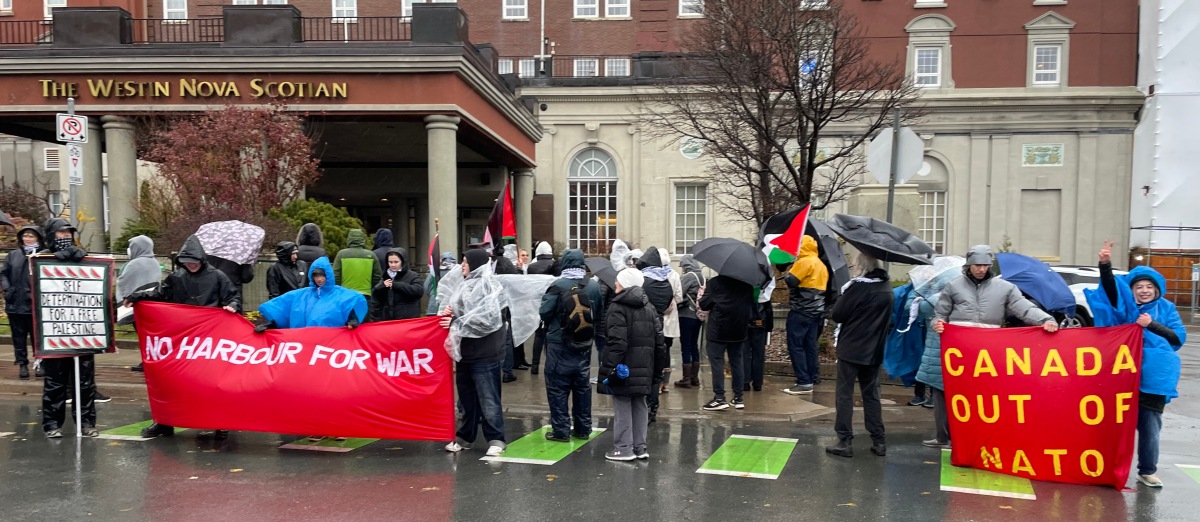
Demonstration at Halifax International Security Forum, November
23, 2024
Despite the pouring rain and high winds, between 50 and 60 people gathered in Peace and Friendship Park to denounce the 15th Annual Halifax International "Security Forum."
These so-called security forums are a product of the aggressive, warmongering NATO organization, and bring together war criminals and warmongers from around the world who are associated with the U.S. empire. Amongst them are those connected with the genocidal campaign of the Israeli Zionists. At this year's conference there was a bipartisan U.S. congressional delegation. These are the same people who welcomed Israeli Prime Minister Netanyahu to Washington, where they gave him numerous standing ovations and voted for credits to support the Israeli war machine.
Additionally these conferences include Israeli Zionist delegates such as former Prime Minister Ehud Barak and other government and military officials.
Protesters this year included many pro-Palestinian activists who were there to express their rage at the U.S. and its allies involved in the current genocide. Speakers at the rally including representatives of Voice of Women for Peace, Labour 4 Palestine, Independent Jewish Voices and No Harbour for War.
With a high level of militancy, people at the rally shouted above the howling winds such slogans as Not one nickel, not one dime. No more money for Israel's crimes!; Hey Trudeau, what do you say, How many kids did you kill today?; Killing children is a crime! Killing doctors is a crime! Bombing hospitals is a crime!
G20 Leaders Summit, Brazil, November 18-19
Another Failed Attempt by
Canada and U.S. to
Rally Support for Ukraine Against Russia
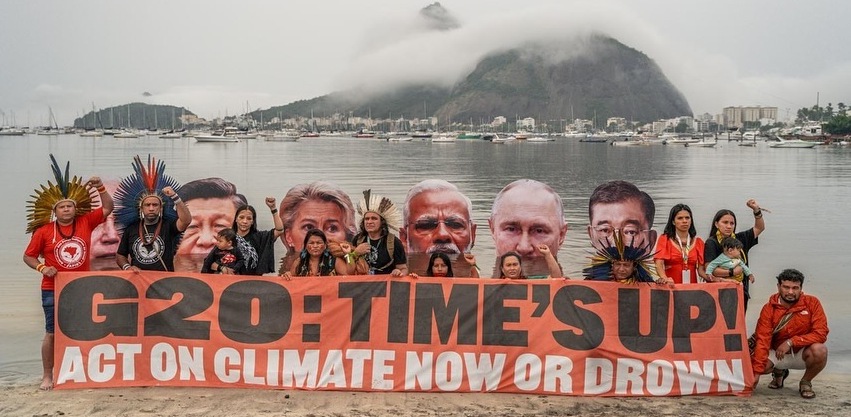
Demonstration in Rio de Janeiro, November 16, 2024, ahead of the
G20 summit
The G20 Leaders' Summit took place in Rio de Janeiro, Brazil from November 18 to 19 under the theme "Building a Just World and a Sustainable Planet." Brazil has held the presidency of the G20 since the last Leaders' Summit in 2023 and this year's summit was hosted by Brazilian President Luiz Inácio Lula da Silva. The presidency goes to South Africa for 2025.[1]
The discussions were based on three themes proposed by Brazil:
1) social inclusion and the fight against hunger and poverty;
2) energy transitions and the promotion of sustainable development in its economic, social, and environmental dimensions; and
3) reform of global governance institutions.
Following discussions and meetings over two days, the Rio de Janeiro Leaders' Declaration was issued containing 174 pledges made in 85 clauses focused around the three themes. John Kirton, director of the G20 Research Group at the University of Toronto notes that many of the commitments made at the Rio G20 Summit were weak and constituted restatements or pledges from previous Declarations with little in the form of concrete actions, except to convene more meetings on an issue. Kirton provided as an example, the "Rio Summit's signature achievement, which as intended, was the formal launch of the Global Alliance Against Hunger and Poverty. However, the leaders' declaration did not contain a commitment to end hunger for everyone by 2030, one of the UN's Sustainable Development Goals (SDGs), as Brazilian President Lula da Silva had repeatedly sought. Nor did the declaration contain any commitments from G20 members to contribute any funds to help meet the Global Alliance's goals or refer to any such funding pledges."
In Rio, U.S. President Joe Biden proposed a "solution" to assist poorer nations with their development as follows: "[W]e need to make sure the World Bank can continue its work in the most vulnerable countries. I'm proud to announce the United States is pledging $4 billion over the next three years to the World Bank's International Development Association. [...] In addition, we have to mobilize private capital at scale. I'm proud of my country's work in this fund, including mobilizing $60 billion through the Partnership for Global Infrastructure and Investment." The Partnership for Global Infrastructure and Investment is a project of the G7 countries pooling private and state capital for global infrastructure projects based on public-private partnerships (P3s).
Biden added: "It boils down to a simple proposition. For countries that are willing to make bold reforms and smart investments, we should do three things: mobilize more resources from the multilateral development banks; two, unlock low-cost private-sector financing; and three, commit [...] to flowing money into these countries rather than taking it out during their need -- their moments of need."
Since the start of the U.S./NATO proxy war in Ukraine, the U.S. and its allies have sought to use the G20 as a venue to isolate Russia and increase military support for Ukraine. At the G20 in Rio, President Biden stated: "The United States strongly supports Ukraine's sovereignty and territorial integrity. Everyone around this table, in my view, should as well. And, by the way, Russia's brutal invasion of Ukraine led to the highest-record food crisis in all of history." However, these efforts failed. The Leaders' Declaration at the end of Summit on the "War in Ukraine" notes "[W]e highlight the human suffering and negative added impacts of the war with regard to global food and energy security, supply chains, macro-financial stability, inflation and growth. We welcome all relevant and constructive initiatives that support a comprehensive, just, and durable peace, upholding all the Purposes and Principles of the UN Charter for the promotion of peaceful, friendly, and good neighbourly relations among nations." There is not even a mention of Russia.
Prime Minister Trudeau criticized the Leaders' Declaration as "not strong enough for me" on the question of Ukraine. He issued his own statement on the G20 Leaders' Summit in which he reported that at the meeting "He condemned Russia's unjustifiable full-scale invasion of Ukraine, which marked 1,000 days on November 19, 2024, and reiterated Canada's steadfast support for the Ukrainian government and people."
In the context of the brutal U.S./Zionist genocide against the Palestinian people, the Leaders' Declaration notes: "Affirming the Palestinian right to self-determination, we reiterate our unwavering commitment to the vision of the two-State solution where Israel and a Palestinian State live side by side in peace within secure and recognized borders, consistent with international law and relevant UN resolutions."
Regarding the global economy and trade, the Leaders' Declaration asserts: "International trade is an important engine for inclusive economic growth, combating poverty and hunger and promoting sustainable development and the SDGs." The trade being talked about here is for a "rules-based, non-discriminatory, fair, open, inclusive, equitable, sustainable and transparent multilateral trading system, with the World Trade Organization (WTO) at its core. Ensuring a level playing field and fair competition consistent with WTO rules is essential to ensuring prosperity and fostering a favourable trade and investment environment for all."
It is precisely this neo-liberal framework for global trade, underpinned by the World Bank, the International Monetary Fund, the WTO, and the P3 infrastructure projects financed by the G7's Partnership for Global Infrastructure and Investment that has led to the privatization of public assets and the exploitation of resources and labour, leading to the impoverishment of countries in Asia, Africa, Latin America and the Caribbean. The Declaration itself admits: "With only six years left to achieve the [SDGs] of the [United Nations'] 2030 Agenda, progress towards only 17 per cent of the SDGs is on track, nearly half are showing minimal or moderate progress, and progress on over one-third has stalled or even regressed."
Clearly so long as it is the G20 or any other neo-liberal economic bloc that is in charge of addressing the UN's SDGs for 2030, no real progress will be achieved.
What all this reveals is that the G20, since its founding in 1999, is not an organization that is going to address any of the development problems the world is facing. The G20 is part of the global system created by the financial oligarchs and multinationals who have taken over the leadership of the biggest economies of the world in order to pursue their own private interests at the expense of the well-being of the planet and of humanity.
The pledges made at each G20 Summit are aimed at disorienting the political movement of the world's peoples from their own empowerment in their own countries. These pledges are aimed at keeping the world's people from taking their respective economies, including Canada's, in a new pro-social direction that would ensure that the rights of the workers, youth, women and all members of society by virtue of being human are guaranteed. This will be the foundation of a new global order where the people of each country can establish relations based on peace, social solidarity, non-interference in each other's internal affairs and trade for mutual benefit.
This alternative for which the peoples are fighting was evident in the mass actions of protestors at the G20 Rio Summit who put their demands and claims front and centre. They called for immediate action on climate change by holding the rich countries who have caused the climate crisis to account; an end to platitudes and instead real action to end global poverty and hunger; and immediate action to end the U.S./Zionist genocide against the Palestinian people and war against Lebanon. The demonstrations called for the government of Brazil to cut all ties with Israel.
Note
1. The Group of Twenty (G20) comprises 19 countries (Argentina, Australia, Brazil, Canada, China, France, Germany, India, Indonesia, Italy, Japan, Republic of Korea, Mexico, Russia, Saudi Arabia, South Africa, Türkiye, the United Kingdom and the United States) and two regional bodies: the European Union and the African Union (as of 2023). The G20 members represent around 85 per cent of global GDP, over 75 per cent of global trade, and about two-thirds of the world's population.
(With Files from the G20 Rio, G20 Research Group, CBC, U.S. White House. Photo: midianinja)
Protesters Demand
Accountability and
Action for Global Crises
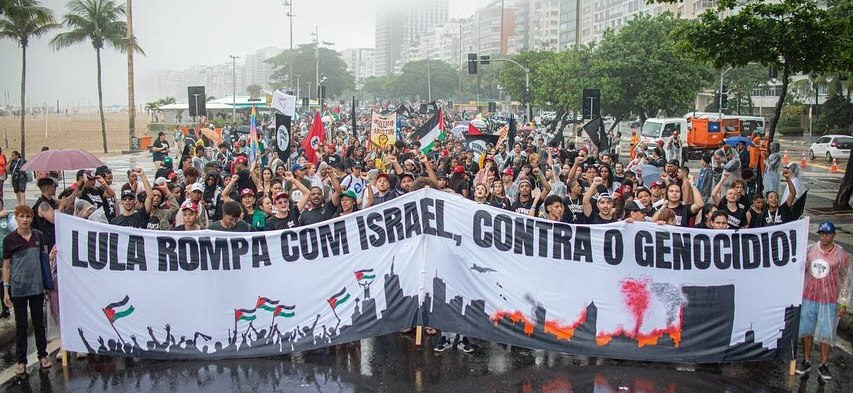
Rio de Janeiro, November 16, 2024
Prior to the opening of the G20 Leaders' Summit in Rio de Janeiro, Brazil, protesters organized mass demonstrations to highlight their demands and hold the leaders of the G20 accountable for the climate crisis, violation of Indigenous rights and escalating global poverty and displacement. Actions took place for the duration of the Summit forcefully demanding the leaders at the Summit take steps to end genocide against the Palestinian people.
Kleber Karipuna, spokesperson for the Union of Indigenous Peoples of Brazil (APIB) told the media that they placed giant cutout heads of G20 leaders in Rio de Janeiro's Botafogo Bay to protest global inaction on measures to stop climate change. "In anticipation of the meeting of big global leaders of the G20, we are sinking these heads to represent how these leaders, who head some of the biggest economies in the world, are failing to face climate change," he said.
This action was the launch of an Indigenous mobilization towards the 30th Climate Conference (COP30), which is set to be held in Belém, Brazil next year. In their call, the activists note:
"We, the Indigenous Peoples of Brazil, in the face of the gravity of the climate crisis, know that the time to act is now.
"We know who is setting the planet on fire and we feel the devastating impacts in our territories and our lives: severe drought, forced isolation, diseases, lack of food, invasions, conflicts, and deaths.
"With the imminent collapse of living conditions in the world, strong and effective actions must be taken. There will be no life on a burning planet.
"The climate crisis is also a crisis of leadership and values. We have never given up on defending life, and we will not get lost in empty discussions and sterile commitments."
Another protest organized by Rio for Peace focused attention on the rising levels of poverty in the world. They placed 733 empty plates on Copacabana Beach to represent the 733 million people worldwide who, according to the United Nations, died from starvation in 2023.
Hundreds of protesters, many wearing keffiyehs, marched in support of Palestine. Carrying Palestinian flags and banners, demonstrators chanted slogans as they marched. They demanded that Brazil break diplomatic ties with Israel and that Israel's allies stop arming and enabling the genocide against the Palestinians.
A union activist who participated in the march told media that the protesters represent a contrast to the G20 and its aims and that the march not only stood with the Palestinian people but was demanding action on the climate crisis and against the policies of the super-rich in the G20 who subordinate other nations to their economic policies.
(Democracy Now, Al Jazeera. Photos: medianinja, redstreamnet)
Commonwealth
Heads of Government Meeting,
Samoa, October 21-26
Reparations Row Shows the Commonwealth Is Long Past Its Sell-By Date
The Commonwealth Heads of Government Meeting (CHOGM) took place in Apia, the capital of the Pacific island of Samoa from October 21-26. The meeting was overshadowed by a storm around the demand that Britain face up to its criminal responsibility for the gross violation of the human rights of millions of people that it conquered and enslaved within its empire. In particular, the point was raised that Britain must make reparations for the ongoing human and social damage caused by its role as the chief human trafficker in enslaved Africans and one of the greatest perpetrators of this crime against humanity. In many ways, this row underlines the fact that the Commonwealth is nothing more than a colonial relic of Britain's imperial days, underpinned by the same racist ideology and that it is time for it to be disbanded.
The Commonwealth currently has 56 member countries, 21 of which are located in Africa and 12 of which are member of the Caribbean Community (CARICOM). There are another 17 former British colonies from Asia and the Pacific which bring the total number of non-European countries in the Commonwealth to 50, or nearly 90 per cent of the organization's membership. However, this numerical preponderance does not translate into power within the organization. This rests firmly with Britain and the European settler colonies it established such as Canada, Australia and New Zealand. The small European countries of Malta and Cyprus are the other two member states.
This racist distribution of power within the organization originated in the development of Britain's empire. By the late 19th century, Britain had already established a racist distinction between its colonies. Those which were European settler colonies were classified as dominions and allowed a large amount of self-governance while colonies without significant European settlement were denied any such control over their own affairs. In 1926 at the Imperial Conference -- attended by the leaders of Britain and its dominions, including Australia, Canada, India, the Irish Free State, Newfoundland, New Zealand and South Africa -- the decision was taken to establish the British Commonwealth of Nations, which is now referred to as the Commonwealth. As part of the agreement, they all pledged allegiance to the British monarch. India was represented by Frederick Smith, 1st Earl of Birkenhead who was Britain's colonial Secretary of State for India and his under-secretary Edward Turnour, the 6th Earl of Winterton. There were no Indians present. South Africa was represented by Barry Hertzog, a Boer general and then prime minister of the Union of South Africa. He was accompanied by his finance minister Nicolaas Havenga. There were no Africans present.
In many ways, today's Commonwealth is simply a continuation of Britain's empire but one in which Britain exercises its control through neo-colonial means rather than through direct colonial rule. Just like its predecessor, today's Commonwealth is an important source of wealth and global power for Britain's ruling oligarchy and its politicians. The population of the Commonwealth amounts to 2.7 billion people which is an enormous market for Britain's capitalist corporations. According to the House of Commons Library, in 2023 Britain's exports to the Commonwealth were worth £89 billion and it maintained a trade surplus of £14 billion with these countries. Trade with Commonwealth states accounts for nine per cent of Britain's total trade. With regard to foreign direct investment, the Commonwealth is a lucrative market for Britain's monopolies which invested an average of £20 billion in Commonwealth countries in 2021 and 2022. Clearly, the Commonwealth continues to serve the interests of Britain's ruling oligarchy. To ensure that this is done efficiently, the Commonwealth Enterprise and Investment Council (CWEIC) has been established.
This is the context in which the row about reparations erupted at the CHOGM. The demand that Britain take responsibility for its past colonial crimes and make reparations to those who continue to suffer the consequences of its wrongdoings is a longstanding one. Therefore, in the days leading up to the heads of government meeting, British Prime Minister Keir Starmer declared that the issue of reparations was not on the agenda for the meeting, that Britain would not apologize for its role as the main human trafficker in enslaved Africans and that with regard to reparations, "The government's position on this has not changed -- we do not pay reparations." Keir Starmer's Labour government's arrogant refusal to acknowledge Britain's responsibility for its colonial crimes reflects the consistent position of successive British governments, whether Conservative or Labour.
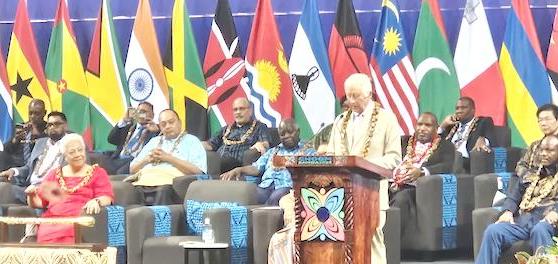 King Charles in his opening speech of over
1,500 words to the Commonwealth Heads of Government Meeting, did
not once mention the word slavery.
King Charles in his opening speech of over
1,500 words to the Commonwealth Heads of Government Meeting, did
not once mention the word slavery.
To add insult to injury, Britain's King Charles then attempted to gaslight people in his address to CHOGM. In his speech of over 1,500 words, not once did he mention the word slavery, nor acknowledge the criminal role that Britain had played in it. Repeatedly referring to the member countries of the organization as "our Commonwealth family," he declared, "I understand, from listening to people across the Commonwealth, how the most painful aspects of our past continue to resonate. ... None of us can change the past." Through this sleight of hand, Britain's king is trying to create the impression that the perpetrator and his victim have a shared past in which each is responsible for the crime. The criminal alone is responsible for the crime and the pain is inflicted on those who suffered at the hands of the criminal.
The fact that the British state, of which he is the head, refuses point blank to acknowledge its crime, let alone apologise or make reparations for it, shows clearly that Britain's rulers couldn't care less about the past and current pain that its colonial crimes have caused. If this is the behaviour within a family, then it is an abusive family. Further, the king raises the old worn-out argument about changing the past as if anyone thinks it's possible to change the past. The demand is that the crimes committed in the past and their consequences both in the past and present be openly acknowledged and addressed.
The British state's gaslighting and arrogant refusal to acknowledge its colonial crimes contrasts sharply with its attitude towards the crimes of the Nazis in Europe. It routinely acknowledges this holocaust while denying its own holocausts of Indigenous genocide, human trafficking and enslavement. It has declared its intention to build a memorial to the victims of the Nazi holocaust, while telling the victims of its own holocausts to get over it. Not surprisingly, the final communique of the CHOGM did not contain a single word of condemnation of Britain's colonial crimes nor a call for it to make reparations. It did, however, contain a statement in support of the U.S.-organized invasion of Haiti. It is evident that the British Commonwealth of Nations continues to be a reactionary organization which serves the imperial interests of Britain's financial oligarchy.
The position expressed by Britain's king and government shows that they remain committed to its imperial ideology of racism. Rather than addressing this central issue Britain has, instead, opted to develop an entire industry based on fake anti-racism. This involves co-opting into the system individuals from communities which are the targets of colonialism and racism so as to give Britain's state racism a multi-cultural face. This was fully demonstrated by the fact that David Lammy, the current British Foreign Secretary, himself a descendant of enslaved Africans, accompanied Keir Starmer and the king to the CHOGM to defend Britain's disgraceful colonial crimes.
In 2024, when people are striving to bring about a world of justice and equality for all, an organisation like the Commonwealth, in which the most abhorrent crimes against humanity cannot even be acknowledged, is an organization which is past its sell-by date. It's time for it to be disbanded.
(Caribbean Organisation for People's Empowerment. Photo R. Palmer)
(To access articles individually click on the black headline.)
Website: www.cpcml.ca Email: editor@cpcml.ca

